#But that being said I think that is central to his initial character concept
Explore tagged Tumblr posts
Note
🌶️
The MCU's Spiderman is not a poor execution of Peter Parker's character concept. He's not even poor execution of Miles Morales's character concept.
He is a poor execution of Terry McGinnis's character concept.
Peter Parker and Miles Morales both have so many fundamental pieces to their characters that are just missing for the MCU's Spiderman. Familiar names are floating around him- Aunt May, Mary Jane, Ganke Lee- but the fundamental ideas that make up Peter or Miles arcs just are not there. Themes like Miles's family expectations, Peter's constant money struggles, and the balancing act of doing good vs trying to live your own life are all absent. Even the idea of power and responsibility isn't properly introduced until the THIRD MOVIE when that really should been the central theme from the beginning.
Rather the MCU Spiderman has way more parallels with Terry McGinnis. Both are young hot shot teenagers who end up being taken under the wing of established and experienced hero who is on their way out. Both have complex relationships with their mentor which in a lot of ways serves as the driving force of their character arcs. Both gain high tech suits which enable their heroism. Both are viewed (or at least supposed to be viewed in MCU Peter's case) as heirs to the legacy of this hero.
It falls apart when you get into how they are different. While Uncle Ben is implied to have existed and be dead by the time MCU Peter is introduced in Civil War it's never actually confirmed and never properly comes up. Meanwhile the death of Terry's father is essentially the inciting incident of Batman Beyond: it's what motivates and drives Terry and the murder and it's fallout are the main focus of the first two episodes of Batman Beyond.
What's more MCU Peter's relationship to Tony is grounded in the fact that Tony just shows up one day and essentially taps him to join the Avengers. Bruce by contrast initially tosses Terry out on his ear, and when Terry turns up seeking justice for his father Bruce can't offer him anything but 'go ask the cops for help', and when that goes exactly as poorly as Terry said it would, Terry breaks into the manor steals the Batsuit and goes to stop Powers himself. Terry has active agency in his own choice to be a hero, which helps define his relationship with Bruce and to heroism. While MCU Peter was doing his own superheroics prior to Tony showing up in Civil War (not that he ever does much of that in future movies) his relationship to Tony is defined by Peter's dependence on him and his quest for Tony(/the Avengers)'s approval. And because they don't even bother name drop Uncle Ben or flashback to him, we're left with the impression that the main thing driving MCU Peter is that quest for approval. His motivations are never more complexly explored, and we don't even really see him just running around Queens stopping muggings or car crashes or anything that hints he enjoys or feels the need to actually help people.
And I think that gets into the final and most important difference between the two. Gotham not only needs Batman, it visibly and obviously and terribly needs Batman. Batman Beyond leans into this because decades without a Batman have left Gotham a cyperbunk dystopian hellscape. The city needs someone to stand up to the darkness, to be a symbol of hope, to be aspirational. Terry taking up that mantel means fighting supervillains, yes- but mostly it means doing what the original Batman did. Solving murders, stopping muggings, rescuing people from burning buildings or fighting off street gangs like the Jokerz.
But even in the earliest MCU movies, New York only needs superheroes when the current world ending threat shows up. Otherwise the city is all bright shinny clean streets filled with haplessly content citizens. This is the only reason that Vision's position of 'Our very strength invites challenge' argument in Civil War makes any sense- because the only purpose of these Superheroes is usually to fight a threat they where somehow responsible for creating. And this problem hits 'friendly neighborhood Spiderman' the hardest because he only has a responsibility to use his great power to solve problems, if their are problems in need of solving. Most of Peter Parker's (and Miles Morales's, Gwen Stacy's, or any other Spiderperson's) day is not fighting alien armies or netherworld gods. It's stopping break ins, rescuing people from fires, or other small scale local threats, that none the less benefit from someone with his abilities to make them better. Either New York in the MCU is an ideal utopian city where the police have everything handled apparently (which ha) or Peter is apparently not interested in stopping bad things from happening. He spends so much of the first movie basically begging Tony to give him superhero things to do, not realizing that he could go outside and find people that need help on his own.
In conclusion MCU Peter Parker isn't 'regular Peter Parker but not an underdog', or even 'Miles Morales but white'. He's 'Terry McGinnis but without any agency in his own heroism'.
#The Spicy Take Zone#Batman Beyond#Spiderman#Peter Parker#Miles Morales#terry mcginnis#MCU#anyways the only Batman Beyond adaption I want is one done by the Into the Spiderverse crew#I can't see a DC live action movie not butchering him badly#the only truly good live action Batman of my lifetime was the Robert Pattinson one#since it genuinely seemed to get the character in a way most others did not
337 notes
·
View notes
Note
how effective is it when diegesis gives lee the kicked puppy look?
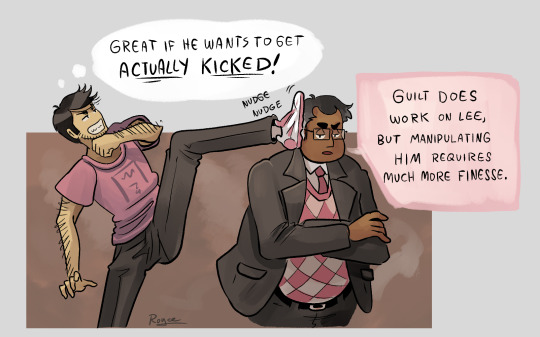
Obvious appeals to his heart receive only kicks; being manipulated doesn't bother Lee so much as being manipulated POORLY.
Patreon | Game Demo
#NonPlatonic Forms#Liam Lee#Diegesis#You know the initial spark for an idea matters much less than how it is developed#But that being said I think that is central to his initial character concept#'If you're going to control me at least make it fun or I WILL find my own fun instead'#'I will only cede control if you prove you're better and buddy my standards are HIGH'#comics#scribbles#picshuas
34 notes
·
View notes
Text
What Is Up With Terry :: the Thread of Necessity
Intro
Terry is an interesting character in a lot of ways. He's unflappably kind and optimistic, accepting even to a fault, and he's an elf with no issue with dark magic yet doesn't seek out its use for himself. He's a non-traditional antagonist for starters, he's trans without being overly sanitized, and he most notably provides a sounding board for more overtly 'evil' characters like Viren in season four and Claudia in seasons five and six. Most of this is in service of Claudia's goals, with Terry not having many of his own goals outside of his support of Claudia and Viren; this is, mind you, not too dissimilar from Soren with Ezran in arc 2 as well, or even Amaya with Janai.
I also think he's a very important in a character in a lot of ways, for the ease with which he explores and exemplifies
You can love / support Viren and Claudia and that doesn't make you a 'bad person' in the show
You can be okay with dark magic without changing your mind and that doesn't make you a bad person either
You can kill someone in TDP and that doesn't automatically make you a bad person either
We know all of this is true (and will likely continue to be true) as we know in S7 there is an episode about Terry related to him still having a "true and pure heart," which is about as classical "good guy protagonist" speak as you can get. In those lenses, I think Terry was a fantastic choice in introducing a new character to not only contrast against Claudia and Viren, but also in terms of getting us to be more sympathetic towards them (particularly Viren) than we might've been inclined towards in arc 1.
That said, I think the most important thread that Terry carries is that he is a character who truly and wholly does whatever is necessary for his cause, nothing more, nothing less.
But what does that mean, tangibly, within TDP's narrative? Well, let's talk about it:
Necessity
The concept of necessity—I needed to do this, or I have to do this (even though I don't want to)—is one that has been central to TDP for a while. We see this characters who cite a lack of agency ("He was going to take Claudia's life, I had no choice" / "Every step I took, I took because I had to" / "I'm sorry. I have to do this") throughout the show, both dark mages and not, particularly Rayla, Soren, and Callum.



And in return for perceived necessity, as Harrow states, "I have done terrible things. I thought they were necessary. Now I don't know." We increasingly see people justify, or struggle to justify, worse and worse actions. Claudia's mindset has become very transactional, for example ("He saved you, and now we have to save Aaravos" / "It's a mistake! I saved you! You owe me your life!"). Generally speaking, the show treats these things labelled as necessary as unnecessary (hence the regret they experience, and even Terry disagreeing more adamantly than he ever has before).
This is, of course, because 4x09 and 6x09 together very clearly spells out what is important for Terry to believe something is necessary: it must be done entirely out of love, no more and no less.
I've seen you do a lot of awful things, dark magic things, but I always believed in you because you had a reason [saving your dad]. But what you just did, the way you tricked that Moonshadow elf? It was just cruel.
Maybe it started out as a story of love, but along the way it got twisted. [...] He isn't doing anything for love. He's doing it out of revenge.
To Terry, you do what you have to do but go no further; you don't give into anger, you don't give into revenge. You act entirely out of love, and keep acting out of love and let it temper you. This is why Terry resonates, I think, and seeks guidance from Viren after the mage's initial assessment of what's been happening, emotionally:



This is similar in practice to why Viren (and Claudia to a lesser extent) are characters with such fraught paths. Not only because of their dark magic use, but because of their denial. Viren violates Lissa's safety and trust to save Soren, but then blames Soren for it; Claudia heals Soren and brings back Viren, and doesn't understand why fixing things physically wasn't enough. "I had no choice" for them means "I have no accountability," and that's why they kept spiralling deeper till Viren broke out of it. He atones then not by swearing off dark magic (although it helps) but by taking full agency in the choice to do dark magic and in what manner (not sacrificing his family again) and without a desire for ego, which was his biggest character flaw in a lot of ways.
The reason I bring this up is to provide a contrast for Terry in a few ways, such as
Terry always being very emotionally open, rather than repressing or offloading blame onto other people
Mandates that he had no choice (4x03, 4x04) but to kill Ibis verbally, but is also aware that it very much was
Is able to accept that this was a choice and move on
Terry does what he believes is necessary. He feels things about it. He doesn't go further into outright self destruction, and he doesn't escalate to what harm is deemed unnecessary. That doesn't mean Terry's levelheadedness can't be a flaw (he absolutely should have told Claudia to give up magic in 6x04) or that what he believes is necessary always is / that his choices are perfect (they're not), but that in his contrast to Claudia and Viren, he continually provides that contrast. He can be held at sword point by Rayla, a total aggressive stranger, and still recognize that withholding her family from her is what he deems as unnecessary cruelty (but more on that later).
For now I want to talk about patterns, specifically two that he engages in with Claudia.
Patterns
The first pattern is unsurprising, perhaps, given that Claudia-Rayla have continually had parallels, given that:
1) Claudia keeps leaving him
This is, of course, most obvious in 6x01 when Claudia states her intention to do so, or even in 6x09 wherein Aaravos literally lifts her away from Terry:



But we also see it earlier on with even the choices Claudia makes in her mission. Terry is a passive person, much like how Claudia at her core is ("Tell me what to do" + 90% of interactions with Viren that aren't about saving him), and therefore Claudia leads the way, and Terry is happy to let her.
He never really considers that he might be a core part of her truth, and that she wants more active advice (see the way Rayla counsels Callum about his dark magic use, comparatively, in 6x03, or nudges him forwards elsewhere throughout the seasons). While Terry isn't wrong to encourage Claudia to think staunchly for herself, and in fact she very much should, it does leave her more vulnerable to the next first person willing to tell her what to do: Aaravos.
We also see Terry's passivity go even further back to one of his first episodes, as well as in the S5 finale.


Each entry in the pattern is a little different.
4x03: Claudia leaves / goes in alone and fails at her mission. Terry follows and saves her by killing Ibis at great cost to his personal emotional state.
5x09: Claudia leaves / goes in alone and fails at her mission. She goes further into Aaravos' clutches (the ocean here metaphorically) and returns of her own accord.
6x01: Claudia succeeds at bringing back her father but cannot make him stay. She leaves on her own in an attempt to break her family's cycle of abandonment without realizing how she's continually perpetuating it, but returns in a devastated and dejected state.
6x09: Claudia succeeds at her mission of freeing Aaravos, and the Startouch elf takes her literally into his clutches and away from Terry.
Each time it is her choice to leave, with only 4x03 firmly having Terry following without her returning by her own merit. Whereas Claudia plays out her family's cycle of abandonment with all its members—her mother, her brother, and finally her father—Terry plays it out with just Claudia, over and over again. This doesn't mean their relationship is bad or that some of these times are unreasonable—Terry is willing and supportive to let her go in 4x03 and 5x09 much the way Callum is supportive of Rayla in 4x09, 6x05, and 6x09—but it is a pattern that has then taken on a negative slant in S6 and will likely to continue to worsen in S7 before it gets better either in the season or beyond.
Then, we have the pattern of how
2) Claudia gradually stops listening to him.
This is probably more interwoven with the thread of necessity than the previous pattern, since as stated before, sometimes when Terry is letting Claudia go off on her own while it's imperfect in the narrative, it makes sense within their dynamic / resources. Like as previously mentioned, too, Terry is more often correct than he is wrong about the next moves people should make. He's right that Claudia will need help in 4x03, he's right that they should go look for her in 4x07, he's right that she needs rest in 5x02, and right to be wary and against Aaravos in 6x09.
In the beginning, Claudia listens to him.


But as the seasons go on, this gradually changes with twice back to back in 5x06.


T: It won't chase us anymore, you won. It's trapped. Please. C: You're right. It won't follow us. But not because it's trapped.


Season six is arguably the season where Claudia listens to him the least despite Terry reaffirming her agency most directly (6x04) as she ignores or doesn't listen to every reservation he has.


T: It's him. It's your Dad. C: Then I have to... T: No! Please! Please don't... I don't think you should see him like this. C: I have to! I came all this way to see him one last time. I need him to show me the right path. T: This won't give you answers. Only anger. Only pain. I'm so sorry. He's gone. He is gone.

And Terry, who does things only that are necessary, only out of love, would know the difference: unlike Rayla, or Claudia, or numerous other characters arguably in the show, he always has, particularly when given broader context the way he is in 6x09 (which hasn't always been true in his relationship with Claudia, either).
None of this is to say that Claudia is a Bad Partner or that your partner should always listen to you, either, because neither of those things are true in life or in TDP. Healthy couples in TDP disagree all the time in both healthy and unhealthy ways. Rayla left Callum when he explicitly made her promise not to, and Callum did dark magic to save her twice despite 100% knowing it's not what she wold've wanted.
But the first thing I want to address is the difference between Claudia leaving out of grief and trying to feel in control after losing everyone but her boyfriend, and Rayla leaving out of grief and trying to feel in control after losing everyone but her boyfriend because they are wildly different for one main reason.
Rayla left in the middle of the night while Callum was sleeping because "you’ll wake up and try to stop me… from doing what I know I have to do. Leaving. But I can’t let you stop me, Callum. No matter how much I want to. [...] And if you said even one word to me, I wouldn’t be—couldn’t be. If I stay even until your eyes open and you yawn your silly morning yawn, I’ll break" (TDP reflections, Dear Callum).
Terry, meanwhile, is actively begging and pleading with Claudia, and he is still abandoned. Granted, Claudia seemingly comes back within a day or two, not two years, so that does mitigate things, but the fact remains that Rayla thought she wouldn't be able to leave to protect Callum if she even heard him speak a word or yawn, and Claudia was able to leave to protect herself while having a full on conversation. Ouch.
Nor does this completely absolve Terry of the one time Claudia straight up asks him to tell her what to do, or what he thinks she should do, Terry doesn't (6x04). He's not wrong that she needs to choose the way and figure out what she needs, but him emphasizing that he can't tell her what to do and then immediately accepting her premises that Viren can and should tell her what to do is something that's already bitten both of them in the ass.
Terry also only asks Claudia to listen to him, really listen, and to tell her what she should do when he thinks it's absolutely necessary.


This is also one of the reasons why she and Terry are suited to each other. Both value and respond to necessity, scaffolding everything else on top of what needs to be done or doesn't need to be done. What's risky about this mutual understanding is the potential for it to stop being so mutual if they start to have different views on what's necessary. And as we see in 6x09, that's happening more and more. What is going to continue happen when Claudia keeps viewing Aaravos' actions as necessary, and Terry doesn't?

Questioning
So Terry is, presumably, going to increasingly be wary and against Aaravos. What is that going to look like?
We have a decent idea, honestly. As stated / noted before, Terry actually pushes back against Claudia fairly often. He's just rather gentle about it, and usually is trying to prioritize her wellbeing (or someone else's) when she isn't. Examples include:
4x09 over the coins / being cruel
5x01 ("You'd think if dark magic does this to a person they might not do it")
5x02 over resting
5x06 over attacking the dragon
5x06 over killing the dragon
6x01 over her leaving
6x04 with telling her what to do
6x08 over seeing Viren's corpse
6x09 in helping / freeing Aaravos
However, we're also yet to see him be angry in his questioning or when pushing back, which is what I think would be most interesting to see change (think the moment where Iroh finally yells at Zuko beneath Lake Laogai). His pushback with Claudia has gotten more and more consistent as well as more dire throughout the seasons, and just like how Viren and Claudia eventually disagreed and split up, I think Terry and Claudia will too. How permanent that split will be, I think, is up to her (I could see parallels happening between Soren and Terry teaming up to try and bring her home, with Ezran and Rayla doing the same for a brother-partner tag team Callum duo), but I do think that Terry's testament of "I love you, I will never leave you" is apt foreshadowing to see what it would take for him to break his promise, and do just that.
To what he knows needs to be done, even if that means walking away.
Misc. Season Thoughts
Terry also has some interesting things that don't fall under the necessity umbrella that I wanted to talk about as well. One of those things is
TERRY AND IDENTITY
This isn't to say I think Terry actively has an identity arc in seasons 4 through 6 the way other characters (Callum, Rayla, Viren) are, but that Terry like most of the main cast is linked to arc 2's continual increased emphasis on identity and choosing your own identity. This is true particularly in 4x01, which opens after the intro with Callum running through / clarifying his titles (or identity roles) and concludes with Viren and Terry being introduced to one another. Terry gives details on his name ("[Terrestrius] is a bit traditional, but my friends call me Terry") and then asks for clarification on what he can call Viren.
Later on in S5 and S6, we see Soren and Rayla respectively see through the 'monstrous' / threat of others by reaffirming their similarities ("I know what this is like. I know how you feel" / "This storm isn't your rage, it's your grief. I know how you feel") and bestowing agency through naming conventions. Rayla identifies the monster isn't a monster but a pet, and more than that, gives Esmeray back her name. Elmer does the same when he overthrows Finnegrin and Soren likewise affirms it: "We literally didn't [defeat him]. Elmer did."
Why is this relevant? Well, in an arc that's all about emphasizing over and over again to see other people's personhood by using their name(s), recognizing that you have a choice, and choosing who you want to be...


So often queer characters in media are regulated to their queerness being happenstance (i.e. they fulfil a certain story role regardless and just happen to also be queer) or it's all their character gets to be (a "figuring out queerness and/or a coming out" arc). One of the reasons I myself (as a queer and trans person) has always deeply appreciated Terry as a queer character, specifically as a trans character, is precisely the way that his transness is interwoven with TDP's broader themes of chosen identity, self-actualization, and knowing / name motifs. In having these themes and ideas for multiple cis characters, Terry's interplay gets to be enhanced by his trans identity and simultaneously let him enhance the thematic explorations the series has going on, and I think that's pretty cool. Identity is one of the main themes of s4, and for Terry as well, so it's nice to see the ways that's reflected.
I expect season 7 to challenge his identity further ("I'm going to be strong enough to do whatever I need to do and still have feelings") if forcing him to confront who he wants to be, who Claudia is becoming, and who he thinks they can still be together. In a lot of ways I'm expecting S7 to be a sister season to S4 thematically even as S7 builds on S5/S6 in terms of plot and character arcs, since S7 seems geared to be about identity directly even more than S4 was (and much more than S5 or S6 were).
TERRY AND COMMUNICATION
If season four is about identity, season five has a strong emphasis on communication. This is, again, likewise true for Terry, as he encourages Claudia to communicate in various ways across the course of the season.


The situation is urgent, and you're worried I'm not treating it that way.

Terry consistently having clear communication is also something that puts him in direct contrast to Aaravos, who is a master manipulator and very careful liar-not-liar in his own way. Terry is always open and while thoughtful does not really bottle things up; he communicates clearly with other people and is comfortable doing so, and is very good at validating others as well. Whenever he does push against Claudia, he always clearly explains why he's doing so or why he disagrees but leaves the choice of what to do next in making amends or carrying on up to her. Aaravos, meanwhile, continually withholds or omits information, and presents things in certain ways in order to get, well, his way.
I don't have as much to say for season six, given that Terry is only in about half the season (6x01, 6x03, 6x04, 6x08, 6x09) and one of those is entirely silent. I'd say his main idea in s6, like s4 with identity and s5 with communication, would be the theme of Questioning (scaffolded under 'supportive'). He's supportive of Viren and Claudia's searches for meaning alongside his own increase questioning of what they and Aaravos are doing and why. I'll be curious to see what his main character beat may be in s7 going forward.
Conclusion
There's more I could talk about with Terry (Viren dreaming in 5x03 of chasing after Claudia only for her not to listen, only for Terry to live out that worst fear in 6x01 directly, for example) but I think for now these are the main things I wanted to discuss without going further into speculation than I already have. I hope this maybe brought a new perspective or appreciation for Terry as a character and for his arc in the show so far! As always, thank you for reading and I hope you enjoy.
#tdp#tdp terry#tdp meta#the dragon prince#terry#analysis series#analysis#parallels#clauderry#arc 2#multi
59 notes
·
View notes
Text
MDZS, CQL and the passage of time
MDZS novel and CQL spoilers ahead!
There's this thing where despite The Untamed / CQL having Wei Wuxian be dead for 16 years instead of 13, everything is meant to feel so much rawer and closer in time than the novel I feel. For a start, naturally having 30 episodes straight of flashback sequencing before depicting an immediate reconcilation between Wangxian really imprints those flashbacks much closer in your mind than Wei Wuxian's actual ressurrection, which happened in episode 1.
Furthermore, there are also these other flashbacks when Wei Wuxian sees something reminiscent of his past, different instrumentals played initially in the flashbacks coming back again to remind you of the themes those instrumentals represent. One of the most distinct examples I remember is in episode 2, when CQL Wei Wuxian sees a vision of Wen Qing introducing Dafan Mountain as the place where her branch of the Wen clan lives in CQL and then remembers the dancing fairy statue. This never happened in the novel- partially because, in CQL, Wei Wuxian was introduced to characters and locations / concepts WAY before he found out about them in the novel (eg.- YiCheng characters, Meng Yao, Dafan Mountain, demonic cultivation in the form of the Yin Iron). By entrenching these places and characters so far back into Wei Wuxian's past- all the way back to his Gusu days, in fact- they feel much more central in the overall plot and connected to the modern storylines involving rediscovering them. Wei Wuxian isn't being thrown into a new world at all, it's the same world with all the loose ends to be tied up. This does force him to remember the past more to deal with the present, and also links the show together in a way that would engage people who have come to watch a put-together story (this sort of strong cohesion I think is less required in novels than in a series because of the way the story needs to flow from 1 episode to the next to be coherent). In the novel, Wei Wuxian's own past storyline has a much slimmer connection to the current events- the obvious kicker being Jin Guangyao in CQL was the main reason Wei Wuxian was villainised and it all comes together in the end, but novel Jin Guangyao just accelerated the process of Wei Wuxian becoming the scapegoat and made this very clear. He didn't know Wei Wuxian would kill Jin Zixuan, he said; even though Jin Guangyao's not the most trustworthy character, how on earth could he have predicted that Wei Wuxian would lose control if he wasn't there to influence him like in CQL?
However, there are even more flashback scenes like the one in episode 35, where Wei Wuxian flashes back to Nie Huiasang being excited about fans and then compliments modern-day Nie Huiasang's fan. Scenes like these cannot be explained by the changed plot because Nie Huiasang and Wei Wuxian being friends at 15 in the Cloud Recesses is canon in all versions of MDZS. Personally, seeing this scene, the strongest effect I can garner from it is nostalgia for simpler times, for people he used to be close with. Memories are flooding CQL Wei Wuxian the minute he's alive again. Contrast this exact scene with MDZS, where Wei Wuxian zones out for a good while after Nie Huiasang leaves- no words of companionship or nostalgia or anything.
Novel Wei Wuxian rarely remembers any of his past life in detail unless he fully means to, actively giving himself reminiscing time, or in a life-or-death situation. The 3 flashback sequences in the novel begin:
when Wei Wuxian decides very specifically to muse over his past with Lan Wangji,
when Wei Wuxian gets stabbed and has to be taken away from Golden Carp Tower,
when everyone turns on him in the Burial Mounds with the same words and having the same intent they did at Nightless City (to harm him, to besiege him).
I think novel Wei Wuxian has spent 13 years in the afterlife getting used to wallowing over his memories, and then consequently repressing and ignoring memories from his past life because they were all associated with pain and bitterness and so much guilt (traumatic, even, but I can't say much from a perspective of trauma because I neither have trauma nor am qualified to know enough about it). Nobody cared for him anymore in his eyes, and he DID lose control, fully feeling himself lose control and accidentally cause the deaths of people he genuinely cared about. The worst-case scenario that he had to contend with actually happening and being, to some degree, his fault. With 13 years to exist as a ghost, I think he had so much time in which he would've had to contend with his choices and death that he fully removed himself from his old life as much as possible, leading to his modern-day gap in memories. You feel the effect of his years dealing with his emotions about this whole mess.
In contrast, CQL Wei Wuxian feels like he is experiencing everything raw when he comes back into the world, like he hasn't been practicing repression to the point of memory loss. Maybe he wasn't conscious during his years as dead? He's introduced with Mo Xuanyu calling to him in his brain during the sacrificial ritual, I think, and is getting told he IS Mo Xuanyu and he is...a tad confused. And then disappointed, but I mean given what Yiling Laozu Wei Wuxian had come to expect after the fiascos that ended his life, he probably wouldn't be too surprised or confused anyways. My theory is that CQL Wei Wuxian likely was unconscious when he was dead whereas MDZS Wei Wuxian was not.
This doesn't seem...important. However it does change who Wei Wuxian is and why he does the things that he does upon reincarnation. Novel Wei Wuxian taking every opportunity to drape himself over Lan Wangji with the purpose of pushing him away makes a lot of sense for a guy who's convinced the worst thing he could do to someone is get too close to/with them; he goes ahead with making a ruckus and trying to make Lan Wangji uncomfortable- without shame (because that's gotta erode away after being dead and reviled for 13 years) and without considering the possibility that Lan Wangji might want to help. Why would he consider that? He doesn't see himself worthy of help or believe anyone would help him, and he's internalised that for years on years.
CQL Wei Wuxian though, he faints on Dafan Mountain due to the weight of his memories- he's confronted with so much of the past so fast and his response is to faint. Barely any ruckus at all. When Lan Wangji finds out who he is, they have a calm conversation about it, where novel Wei Wuxian is like "oh frick he called me Wei Ying" and pretends nothing happened. CQL Wei Wuxian is a lot more open, and I think part of that is because he woke up from his death and was given the support he needed in his previous life within a couple of days. He didn't feel the years go by, have to deal with the consequences of the things he did alone (and in CQL 60% of them weren't even his own actions), so he didn't build himself the same kind of emotional fortress novel Wei Wuxian did.
CQL Wei Wuxian is jaded, true, but not the kind of jaded that comes with floating around in the afterlife for over a decade. It's easier for him to get back into this world and solve a little murder mystery together with Lan Wangji- they fall into step with each other perfectly- while novel Wei Wuxian is still getting his footing. Thus, CQL Wangxian's relationship doesn't evolve the way book Wangxian's do in Wei Wuxian's new life, and Wei Wuxian's reason to be back in this new life is far more about getting back that which he lost (Lan Wangji, a claim to justice) as opposed to gaining something else, something new and all the more important for it (a newfound relationship with Lan Wangji). Novel Wei Wuxian being so out of sync with the new world around him, in both memories and relationships, means that he has so much more room to grow in his present life as he can stop being haunted by the past. I'm not saying this is better than CQL, that's really up to what you like in your media, but this puts Wei Wuxian in a very different position in MDZS than in CQL, and also fundamentally changes their purposes and outlook on their new lives. Whether the focus of his character development takes place in the past or in the present. Whether it's about tying up the loose ends of the past, or chucking out the tapestry of the past to weave a new future.
#mdzs meta#mdzs#wei wuxian#cql meta#cql#the untamed#lan wangji#wangxian#nie huiasang#jin guangyao#analysis time by me so I can track them in my tags#time#mdzs headcanon#posts originating from my brain
60 notes
·
View notes
Note
idk if it’s ever been talked abt before but i was suddenly gripped by physicist in the love hotel thoughts like. what would be their ideal??? what would go down???
the love hotel is actually an insane concept but now i can’t help but think about it with physicist (and physouma, of course)
phys in the love hotel .... i dont think ive talked abt it before ? at least not at length . probably bc the love hotel is Slightly Weird to me , even if u hc the characters as adults which i do, there's still like . shinguuji, shirogane and iruma's which are just certified dr freakishness all over.
HOWEVER i think ive said before im a big fan of some of them. i love ouma's for character reasons and bc when i played the game i was a much bigger saiouma shipper than i am now ( not that i dont ship them anymore they just dont take up as much space in my head + i prefer kiiruma lol ) . i loved amami's , kiibo's, harukawa's, and momota's too :3
PHYS THOUGH . ok lets think. lets ponder together. we r those monkeys holding hands and spinning rly fast in a circle. you mentioned with physouma BUT i wanna quickly explore what a canonverse phys kamasutra event would look like, which would be with saihara.
i think it would be one of the events that kinda . border on romantic ? but is never explicit. definitely one of the more wholesome ones that would maybe revolve around them bonding or opening up to each other and ends with some slight physical touch ( which is sort of a big thing for phys ) like them resting their head on saihara's shoulder or them cuddling up in bed together and falling asleep. i think that could be kinda cute :3 as for the 'ideal' saihara would play for phys i can imagine it being maybe a childhood friend or a classmate they've known for a while, so they dont have to do the building blocks of building intimacy or small talk . which makes them anxious.
OKAY PHYSOUMA TIME. claps hands. the 'ideal' ouma would be playing would probably look different, since it's implied a big part of phys's initial attraction to him is trying to solve what makes his brain tick. they're a lot like saihara in that sense , and i feel like their love hotel event would take a similar form to the saiouma event in the game, with ouma playing like a phantom thief and saihara as a detective . very classic. but phys doesn't suit the role of a detective , exactly...
ok angsty thought . it's been mentioned that phys has passed through a few orphanages and foster homes so what if ouma as their ideal was another kid there . one who was super mysterious at first but is implied through phys's dialogue to have gradually opened up, and is now at the point where they have a fully trusting relationship. like phys makes comments on 'i'm so glad you opened up to me eventually' and 'i feel like getting to know you was such a puzzle... but i'm glad i stuck with it in the end! because it was worth it, for you.' AHHGHGHH sticking my head into a drain and screaming so my agony is reverberated throughout the entire street. just . so much emphasis on how phys's ideal for ouma is one where he trusts them entirely and their relationship is based on open and equal communication.
i can also see phys confessing and that being like the central kind of .plot point for lack of a better word. like the whole thing is kinda building up to it and ouma's getting progressively more nervous as he realises what they're getting at. i think he would try to evade it at first , do his normal tricks, but it risks the dream ending because phys's ideal of ouma is one that Doesn't Do That. so he very uncertainly relents and allows them to express how they feel . and at this point he's all I've Made A Big Mistake because its gotten way too emotional and intimate and theyre looking at him for an answer and it feels so real .
would he confess back or let the dream end . i guess it depends on how far in the story we are . sickening as it is. in a non killing game au i think he would confess . i think far enough into the story he also would , knowing that he cant and wont in real life because of what he plans to do in chapter 5 . but who knows ! who knows.
54 notes
·
View notes
Note
hi!! I was wondering if you could explain how people break up the seasons of hannibal? I understand 3a/3b but is there a 2a and 2b??? (also I love your blog and analysis’ if you see someone spam liking it’s me sorry😭😭)
aww thank you so much, I’m so glad you like my blog :”)) and no worries, I’d be happy to explain! fair warning though, I’m gonna give you a very detailed answer because I love talking about the nuances of plot and hannibal is so neatly structured it makes me want to devour it <3
so throughout the show the story follows several plot arcs at once (which all constitute the main plot) and because s2 and 3 roughly follow two at a time they’re categorised as either ‘plot arc a’ or ‘plot arc b.’ it’s pretty easy to identify the a/b plots in s3 because they’re so distinct (the florence arc vs the red dragon arc, as you know), plus there’s a big time jump and setting shift.
in s2 it’s a little less clear but still identifiable. s2a follows will’s imprisonment arc which roughly makes up the first half of s2 (I’d say from kaiseki until halfway through yakimono since there’s an odd number of episodes per season) while s2b follows his seduction arc. short-term character goals also change between arcs. for example, in s2a will’s main goal is to prove his innocence, hurt hannibal and escape incarceration, which is resolved once will proves the copycat killer and chesapeake ripper are the same and jack finds miriam alive. however, by resolving the central conflict of s2a will is suddenly faced with new problems/circumstances. thus, in s2b he has a new goal, which is to lure hannibal and assist jack with his capture. this plot thread is resolved in mizumono after hannibal escapes, ending s2b and setting up the central conflict and stakes that underpin s3a (and so on until the main conflict is resolved and the show finishes).
s1 is a little trickier to break up since it doesn’t follow the same structural pattern as s2 and 3. there’s no clear shift mid-season and will’s goal throughout stays the same, which is to find the copycat killer/chesapeake ripper while simultaneously trying to find himself during his sessions with hannibal. i.e no one really says ���s1a’ and ‘s1b’, it’s all just s1. that being said, I personally have a system of breaking down s1 because I think there are small shifts present throughout the season regardless, even if they’re more minor. this is how I do it:
episodes 1-4 (initial set-up): sets up main themes/concepts the show explores + sets up will’s character by mirroring his psychology with each of the killers (and his foil dynamic with hannibal).
episode 5: transition between initial set up and friendship arc. out of all the killers so far (excluding hobbs) the angel maker reveals the most about will directly.
episodes 6-8 (friendship arc): sets up hannibal and will’s relationship more closely, with specific focus on hannibal’s masks (the psychiatrist vs the chesapeake ripper) and person suit. he destroys the two extremes of his personality (represented by franklyn and tobias) and chooses will despite himself. the rest of the show follows the consequences of this choice.
episode 9: transition between friendship arc and encephalitis arc. after the angel maker, the totem maker (interesting that they’re both “makers”) reveals the most about will directly.
episodes 10-13 (encephalitis arc): end result of everything that’s been built so far, concerning both will and hannibal (as observed through the first two mini arcs, the first focusing on will and the second focusing on hannibal). we look into will’s neuroses and understand his nature, separating him from hobbs, gideon, and georgia (note that the latter two are explored through the water/fire symbols, tying them together). hannibal also becomes semi-aware of the conflict between his need for love and want for control. this could also be described as their mutual “coming to awareness” arcs. by the end, both their s1 person suits (the most “human” aka morally acceptable/meek personas) are destroyed, and we’re left to explore their “monster” sides in s2.
I hope this helps and thanks again for the ask !!
#I want to break down s2 and s3 more closely tbh#like I did with s1#because even though they both follow the a/b plot structure there would definitely be smaller nuances throughout#I also want to break down will’s character more thoroughly because his progression in s1 is so insane to me#I love how the show plays with unreliability#I need to finish rewatching s3 to do this properly though#also want to talk more about how the show uses doubles to explore will and hannibal’s relationship because every minor character is relevant#actual insanity <3#ask response#nbc hannibal#hannibal#will graham#hannigram#hannibal meta#ghost speaks
90 notes
·
View notes
Text
How the Phantom Thieves Became the Bad Guys (OR: A long-ass essay that’s likely to irritate any P5 fans that bother to read it)
PREVIOUSLY: I came to the sad realization that “Joker” — a.k.a. the Persona 5 protagonist, a.k.a. Ren Amamiya — is canonically an asshole.
...so I suppose the logical extension of that is for Joker to become a villain.
And as it turns out, thanks to the third semester of Persona 5 Royal, he can! They WANT you to.
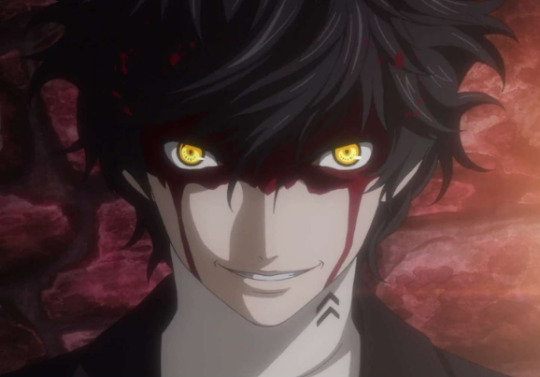
I guess you could say the warning signs were always there.
...of course, alternatively, he might not. Because thankfully, the freedom of player choice still gives you some ways out. But sadly, the “True” (i.e., canonical) ending of the game requires Joker to lead the Phantom Thieves into a very dark place indeed.
Before I delve into why that’s the case, though, I have to give the devs at Atlus credit for creating an ethical scenario that really challenges the player and makes them think. But uh, if you want to feel okay about pursuing the “True Ending,” you definitely shouldn’t think too much. It’s best that you just take the words of the characters at face value and try not to apply real-world morality, okay? Because applying serious thought to the moral debate in the third semester swiftly makes the Phantom Thieves into bigger baddies than some of the palace rulers they’ve previously battled.

Enough of the buildup, however. Let’s back up and dig into the core issue I’m talking about: Takuto Maruki’s quest to make the world a better place.
The Setup
Maruki is a psychological counselor and cognitive researcher as well as a Social Link/Confidant that’s unique to the “Royal” version of the game. He’s also the central figure behind the new storyline that takes place after the ending of the original Persona 5. Said storyline involves Maruki leveraging his work as a psychologist and his studies of the cognitive world + Yaldabaoth’s merging of Mementos with the real world to rewrite reality, creating a new world where people’s innermost wishes are made real. The result? People who lost loved ones in traumatic ways see them now returned to life. People who experienced horrific injuries have had them undone. Rape victims were never violated in the first place. People who lost their dream jobs are suddenly re-employed by them. And so on. This is Maruki’s way of helping people move past being haunted by their traumas and worst experiences; now they can simply never have had such experiences.
Maruki is a very kind-hearted soul from the moment we first meet him. There’s never any doubt that he’s simply trying to make the world a happier, kinder place. And when he first triggers the change into a new timeline, most of the Phantom Thieves are blissfully unaware that the world has been rewritten around them. No less than three of our teammates are reunited with parents who died recently or years ago, although from their perspective, it’s not a “reunion” — it’s just the way things have always been, because those people were never murdered in the first place. Our lead character, Joker, and his rival/ally/antagonist, Akechi, are initially the only ones who remember the old reality. But Joker is soon triggering the rise of conflicting memories within his allies that make them call their new existence into question, even if just slightly...
(It’s cool how well this all aligns with a major area of current psychiatric research. Medical researchers have been seeking a way to target and delete traumatic memories from PTSD sufferers for well over a decade now, moving ever-closer to success. Traumatic memories can be debilitating to a level that millions of sufferers never can recover from their worst experiences even after living many decades more, frequently driving people to suicide; what if you could stop having to relive them? Granted, this wouldn’t literally undo them as it does in Maruki’s solution, but I think the core concept is similar, and that’s pretty neat. Though I have no idea if it was all intended and the devs actually knew about this... )
Concerns?
When I first entered and swiftly understood Maruki’s “new reality” in the game, I immediately theorized TONS of ways in which this could be a very bad thing. And even as I went through the initial phases of his palace/laboratory and slowly learned more about the situation, I continued to come up with new possibilities for why this could be a problem for the world.
...so what’s amazing is how, though a combination of main story dialogue and optional side dialogue, the game successfully addresses EVERY possible problem and erases ANY doubt regarding Maruki’s solution. I assume they were going for a more nuanced moral debate, but in practice wound up in a situation where Maruki’s solution carries only the slightest ambiguity as to its righteousness.
So! Let’s go ahead and break down EVERY concern I had... and how the game either dismisses them or muddies them up quite a bit.
Concern #1: Maybe this reality is fake, and the resurrection people are just illusions/cognitive beings? ANSWER: No, this is not the case. During their first couple of discussions, when Akechi asserts that this reality is phony, Maruki assures him that it’s every bit as real as the one they remember. Moreover, Akechi himself confirms this in his next phone call with you; he investigates the possibility that Wakaba Isshki is either an illusion or cognitive existence, and he confirms that she is indeed the real Wakaba. In fact, his research confirms that she simply didn’t suffer the incident the vehicular accident that previously ended her life... and history was rewritten from there. Per his testimony, this isn’t a false reality at all — it’s an alternate universe or new timeline with its own distinct history. Think of it like we just jumped to a new “world line” in Steins;Gate or something.
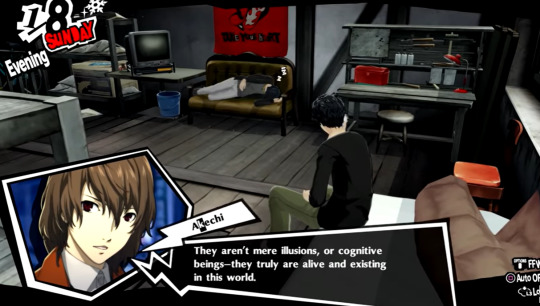
The dark side implication of this fact is that it means that if someone WERE to revert reality back to its previous state, that’d be effectively the same as killing them yourself.
Concern #2: Does this mean that people will never undergo loss or pain of any kind? No, negative experiences definitely still exist. Note that Yoshizawa still has endured the loss of a close sister who was killed in a vehicular accident! And the Niijima family is still missing their deceased matriarch. Ann specifically mentions how she was “so sad” when Shiho transferred away to another school. In fact, even Shido is confirmed to still be under arrest for multiple confessed crimes (courtesy of the Phantom Thieves) in this reality! But that last one could be an example of how people who don’t accept this new reality can continue to be trapped in their old struggles. You can see that particular problem in the homeless man in the subway... and even more blatantly in Akechi. He’s very open about his hatred of this new reality and his opinion that he needs his miserable life experiences. He literally defines himself by his trauma, which is... uh, not a good argument. In fact, Akechi is so messed up (and historically has been such a hostile, malevolent force) that his hatred of the new reality feels more like a ringing endorsement than something we should agree with. HOWEVER... it’s worth noting that later on in the “true” story route, Maruki continuously refers to his reality as one where nobody has to suffer. So perhaps the lingering tragedies/problems I’ve mentioned are actually imperfections he intends to iron out? Or it’s possible he’s just simplifying the situation, boiling it down to the essence of his argument even if it’s not strictly the case. UNCLEAR.
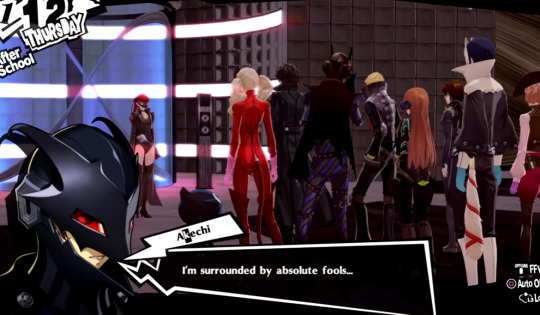
Remember: If Akechi thinks something is foolish, it’s probably a very good idea.
Concern #3: Is everyone just going to live incredibly easy lives, then? Everybody gets whatever they wish for now? First: That’s literally impossible. It is inevitable that people’s wishes will conflict with one another. Second: It’s pretty clear that goals/wishes which logically require effort to be actualized will STILL require that effort. Sae Niijima is still said to be working late nights in her job as the district prosecutor ever after the new reality emerges, and Ryuji is literally doing laps around the school EVERY DAY in order to stay in shape and keep his track skills strong. So NO, it’s not like everything just comes on a silver platter without even trying for it. Third: In all other situations beyond ONE thing on January 1st (the first day of this new reality), it seems like the new world isn’t going to just give out every desire you might think of. See, the narrative waters are muddied by the fact that Yoshizawa wishes to not encounter a crowd at the shrine on New Year’s Day... and then, shockingly, it’s mostly empty. But for the rest of the story, this trick is never again employed. In fact, there are situations in which people would OBVIOUSLY be thinking or desiring something other than what they have, but they still aren’t magically granted the perfect life. Just look back at Concern #2: Are you telling me that it never would’ve occurred to Yoshizawa to NOT have such a tragedy in her past? In fact, just rewind back to my second point under this very concern - are you going to tell me that Sae never once wanted to have a lighter workload? And why the helld did Shiho EVER transfer away from Shujin in this new reality, huh? So the most logical conclusions here are either that A) The new reality was still forming (this was its first day after all), finding its footing and still in flux, but immediate fulfillment of random frivolous wishes won’t apply after this point. OR! B) One-off wishes that are specifically spoken aloud might be granted, but otherwise the focus is on granting the SINGLE deepest wish of each person.
Concern #4: Wait, what if some real assholes/terrible people make destructive wishes? In the real world, somebody casually thinks “ugh, I want to die” all over the world at every second, and a few people probably think “Jesus, just blow up the planet” every few minutes, but it’s not like we see random citizens keeling over or the world exploding under Takumi’s new reality. But this is a fictional world, so maybe those kind of thoughts/statements don’t exist there. In which case the fact that Shido is currently still imprisoned for his crimes seems like evidence enough that destructive wishes being granted isn’t going to be a concern. Does anybody really believe that Takumi would hand someone like Kamoshida his greatest (...and probably dark and perverted) wishes? Nah. No fucking way.
Concern #5: If Kamoshida never was at Shujin and never abused/violated anyone, and Madarame was actually an honest and supportive “master” to his apprentice, and Okumura is a caring boss and devoted father... does that mean the Phantom Thieves never existed in this world? Does that erase the special bond our characters built? ANSWER: No, it doesn’t mean that. I already mentioned that Shido is behind bars in this reality just as he is in the preceding one, and this is (as ever) courtesy of the Phantom Thieves. The Phan-Site is still running and putting out polls, and they’re still viewed as heroes to the masses. The Thief squad still possesses the same special connection they always had.
The Stickiest Wicket: Kasumi and/or Sumire
Ultimately, the BIGGEST concern for many people about Maruki’s actions is what’s happened to Yoshizawa. She no longer even knows her real name (Sumire) or who she was born as. She’s living her life entirely as a deceased person (her sister, Kasumi). She fully believes she is that person, and she acts and thinks and feels just like them.
A lot of people find this creepy or weird, but Maruki originally triggered this change without even knowing he was doing so. Furthermore, it happened because that’s what Sumire wished for. It’s her own desire!
But once Maruki realized Maruki’s argument is based in the trauma that got her here. Because, you see... Sumire is responsible for her beloved sister’s untimely death. Not in a direct “I literally killed her” sense, but I mean... Sumire picked a fight with Kasumi in the streets and then ran away upset, Kasumi naturally/obviously pursued to try and calm her down, Kasumi screamed out to Sumire to not run into the street because vehicles were coming, Sumire ignored her and ran into the street, Kasumi catches up to Sumiere JUST enough to shove Sumire out of the way of an oncoming truck... and Kasumi pays for that with her life.
We are made to live out this experience in first-person view, and it’s harrowing. Afterwards, Joker and Maruki make some effort to calm and/or comfort her. Maruki gives her the opportunity to live her true self from then on and help her move forward... or to revert back to Understandably, Sumire can’t comprehend having to live with this deeply traumatic experience in her mind.
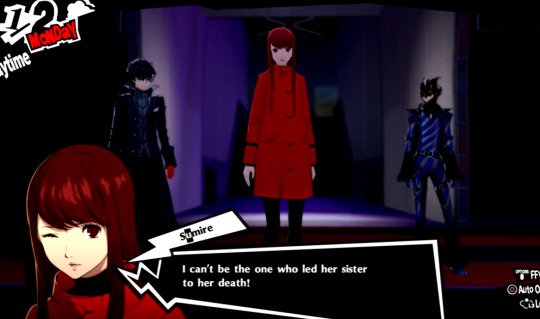
No shame.
I come at this storyline from an unusual perspective because a very similar story happened near where I live when I was growing up. The story of a man who accidentally wound up causing his wife’s death while they were on their honeymoon.. it absolutely shook me to my core when I was a young teen. I won’t get into the messy details because I’d prefer to not pass the horror of a real-life tragedy on to a bunch of people, but suffice it to say that it was absolutely, undeniably an accident. Even so, he was similarly wracked with guilt. The area community watched that man’s psychological state completely collapse. He never recovered, and it was hard to blame him for that.
I can’t imagine how I’d ever recover if I accidentally caused a loved one’s death, either. And hopefully, very few people will ever have to know such horror. If I knew someone in such a situation, of course I’d be there to support them while simultaneously encouraging them to get professional help they can lean on. I’d encourage anyone in such a situation to seek out help and try to support them, naturally. And Joker does do that! But holy shit, when we see flashbacks to the aftermath of the tragedy, Sumire is DEEPLY miserable. She can barely go through the motions If Sumire believes that she is Kasumi, it does more than just help heal her feelings of inferiority — it also means that she endured a tragedy in which her little sister died because of said sister’s own actions As we’ve established - tragedy still exists. Either sister being gone is a tragedy. And Sumire who died - not because of Kasumi but because of her own fault? Its still tragic (once again, reminder: hardships and tragedy still occur here), but it’s not completely debilitating in the same way.
In light of what I saw happen so close to home, I don’t blame Yoshizawa for choosing this life at all. It’d be preferable to just have both sisters alive and together, but it does not appear that Maruki has control over what people wish for. If he did, then maybe he could restore her sister and help build up her confidence from there... that’d be greatly preferable. But if this is her biggest wish — to simply BE her sister and live life with Kasumi’s confidence — then I’m with MarukI: At least this lets her live her life happily and at peace.
I get that it’s not the perfect solution. But I’ll take whatever option is available that prevents a situation like the doomed, self-destructive widower I mentioned three paragraphs earlier.
Maruki is Doing the Same Thing the Phantom Thieves Did... But Better
Based on the above, this seems pretty win-win for everyone (although Sumire is certainly a debatable case). Well... it’s a win-win for most everyone except Akechi; he interprets any change to the current timeline as a removal of his free will. (Which obviously isn’t completely true; we watch a whole load of characters making clear decisions and choices during this arc, even before they are ‘awakened’ from this reality and, if they accept Maruki’s reality? Even AFTER that, too. So Akechi is full of shit, ofc.) In fact, Akechi is so dead-set on following the path he already chose that he’s still grimly adamant about doing so after finding out that he’s dead in the original timeline. Akechi insists that only HE can choose what is the truth, which is very much aligned with how he used to frame people for crimes in order to get credit for their arrest :P .... AND also not at all far removed from Maruki’s stance. Except Akechi’s “truth” is self-destructive, and Maruki’s “truth” is a positive for goddamn everybody.
Explained another way: The Phantom Thieves as a whole are doing the same thing as Maruki, just on a smaller scale and without actually addressing the societal problems that create such unfairness. The Phantom Thieves have spent this entire game forcibly changing the hearts and cognition of criminals and awful people, but they’ve never bothered to examine the root of such problems. Maruki is simply taking a single swing at erasing systemic injustice and sudden-onset cruelty in the world. The Phantom Thieves are firefighters; Maruki is an architect. The Phantom Thieves are whacking down whatever moles may pop up, but Maruki? He’s dismantling the whole rigged-ass game.
And y’know, considering how much Joker and the Phantom Thieves talk about carving their own future and free will and stuff in the “True” ending.. they sure do strip a whole lot of people of THEIR free will during the game’s campaign, don’t they?
But look, I’m sure they don’t care about that. Because somewhere along the line — and it’s hard to pinpoint exactly where —the Phantom Thieves stopped caring about other people. As in: Anybody outside of their own group.
The Phantom Thieves’ Great Big Selfish Dick Move
In the “True” route, once the Phantom Thieves remember their past lives, they struggle for a bit with the idea of whether they’re doing the right thing by opposing Dr. Maruki and the new timeline. He’s only trying to help people, after all. Including all of them.
But Ryuji gives a little speech that gets everybody on-board with changing Maruki’s heart and returning to the former reality.
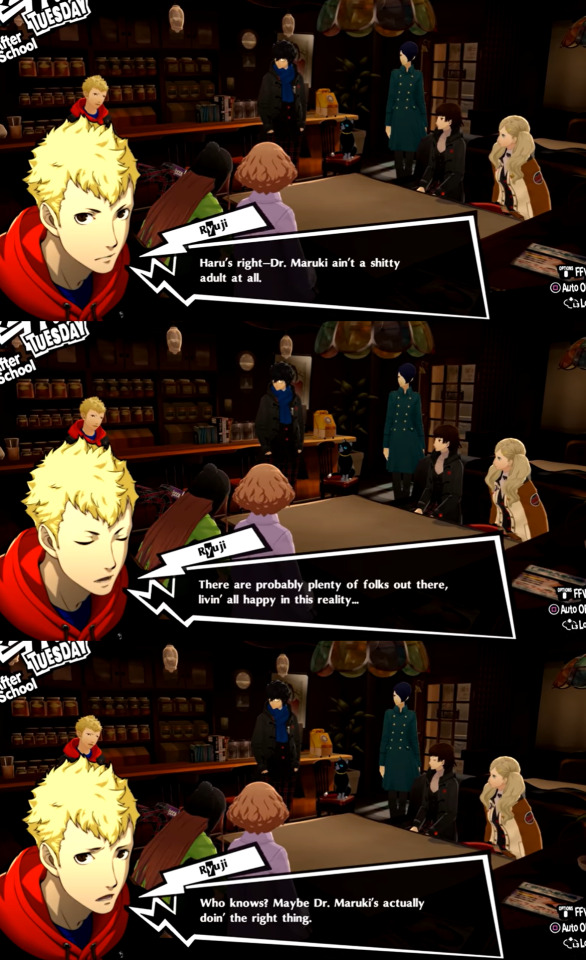

WOO! FUCK everybody else who is living their lives happily! FUCK all the people who are now LITERALLY ALIVE in the new timeline! Let’s re-murder them, re-traumatize people we know (umm wasn’t Shiho literally raped in the original world? but not in this timeline?................... so WTF are you fucking doing you fucking monsters??????), because ONLY WE CAN DECIDE ON OUR REALITY! And we remember the old, shittier one right now, so let’s .... default to that one I guess! Despite the fact that this is one is already established to be EQUALLY FUCKING REAL.
Shockingly, the rest of the team chooses THIS is the time to finally fucking respect Ryuji. (NOTE: The time to respect Ryuji was, in truth, every single damn day BEFORE this one. He’s an excellent human being. Or... he was. Before this moment.)
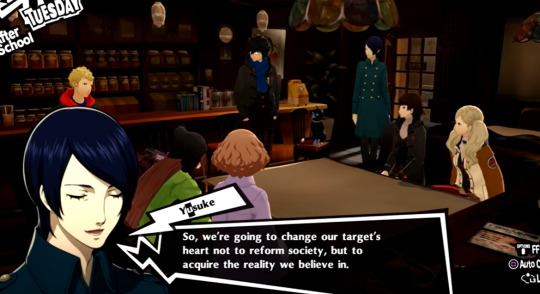
BUT NOT EVERYBODY BELIEVES IN IT, YUSUKE! What about all those people who are happy here? And what about the fact that this reality isn’t any less real than your original one? Remember: This is LITERALLY happening. This is a valid AU. There’s no trickery employed. No illusions. This is a new timeline that is VERY real.
So, why?! WHY ARE YOU DOING THIS?!?!
.........................towards the end of the chapter, there’s an argument made that humanity has to suffer and overcome trials and struggle in order to develop and grow. Of course, we’ve fairly well shot down the idea that there’s zero suffering in this reality (see Concern #2 above) or that there’s no effort required (see Concern #3 above). But even if we hadn’t, there’s a bigger question to face here: Is there any evidence to suggest that people WON’T grow or evolve without struggle and suffering? Can we actually back that up, this idea that we have to “overcome” in order to become better people?
I submit that we cannot. I further submit that this is the argument of the downtrodden; the argument of the sufferers who wish to justify their own misery to themselves. But in reality? They can’t say for certain that loss and trauma are “good.”
In fact, let me argue right now that such things are inherently BAD. People who suffer from PTSD are far more likely to have suicidal ideation, and a 2021 study showed that suicide rates are more than four times higher for people suffering from PTSD than without. If we could really erase trauma and PTSD from our world, I think we can safely say it’d make a VERY lasting impact that would be EXTREMELY worth doing.
It seems that the “spirit of rebellion” within the Phantom Thieves extends to “any decision or idea any adult has ever implemented regardless of merit.” They’re teenagers, after all... and not a single one of them is as mature as someone like P3′s Mitsuru, so I accept that their knee-jerk rebellious instincts might be overriding their ability to think logically.
Or, let’s be more charitable about it. MAJOR DIGRESSION: This could be a situation kind of like writing Star Trek: Insurrection. (I know most of you won’t understand what I’m referencing here. I’m sorry.) That movie presents a sticky ethical debate: Is it OK for a government to forcibly relocate a population of 600 people if their current homeland contains some natural healing mojo that could be used to save *billions* of people across the galaxy? Patrick Stewart once said that he was forced to make Picard very narrow-minded in order to serve the needs of the movie’s story. Because if that same story was presented in the format of multiple TV episodes, there would’ve been time to explore a bunch of alternative solutions that weren’t as binary as “force them out and take all the healing mojo OR leave them be and don’t take any of the healing mojo.” There would obviously be multiple negotiable middle grounds that just aren’t discussed because of time constraints. (To his credit, Picard DOES try to throw up a bunch of alternatives during his confrontation with a superior officer. They’re all shot down with hand-wavey explanations, but at least a few are suggested.)
DIGRESSION OVER. My point? Maybe that’s how it is here, too. Maybe the Phantom Thieves just can’t afford to sit around and discuss this matter in a serious debate because the game is already SUPER long; they need to get the fuck on with it and not just pump you full of non-interactive cutscenes, so Ryuji simplifies everything. ............. It’s just that he does so in a manner that makes the squad look really short-sighted and selfish.
In Conclusion
I took Maruki’s deal. That was MY ending to the game. And it might very well be the best ending available! Although I’d be willing to at least consider the original Non-Royal, didn’t-completely-Maruki’s-Confidant ending as a semi-contender... but DANG, yo. It’s tough to beat the Mega-Happy New Reality Ending. (I subsequently watched the rest of the “True” ending only on YouTube playthroughs, which is where I nabbed these screenshots.)
Taking Maruki’s deal results in basically everybody getting a fulfilling, beautiful life. Although I admit that I have no idea how Akechi is now part of the new reality... because he was never going to accept it, right? And we established repeatedly that those who don’t accept it can’t really reap the benefits, so... why is he now a legitimate “detective prince” whose external behavior from the first few chapters of P5 is now actually who he is inside? How’d THAT ever happen? Not sure about that shit.
Even so, it’s a long and beautiful ending full of gorgeous art of the squad all living their best lives. Morgana is relegated to just carrying “Miss Ann’s” bags while shopping, and he doesn’t even care - he’s just happy to be there. Makoto and Sae get to have dinners with their father again. Haru is more directly involved in the “Big Bang Burger” business, working to keep it ethical and respectful of the neighborhoods where they open as she prepares to carve her own path after high school. Makoto and Haru even get to graduate.
The whole thing wraps up with Sojiro inviting Joker to finish his high school experience in Tokyo. That’s right - he’s asked if he’d like to stay at the cafe and Shujin for his third and final year. Naturally, he’s happy to accept the offer. That means he’ll even be there for an overlap with Futaba’s FIRST year in high school. (Plus he no longer has to return to his small suburban town and his parents who NEVER ONCE CALLED OR MESSAGED DURING THE YEAR, WTF??? ............ or uh, maybe that happened offscreen?)
It’s really weird how the writers of Persona 5 Royal SO THOROUGHLY argued against any possible downside of Maruki’s new reality. I get that they wanted a complex issue to grapple with, but if they really wanted us to choose to reject the new world and pursue the True Ending, they should’ve given us some kind of good reason, right? Even if it’s just a small reason, there’s got to be an argument that’s better than “I don’t like the idea that the timeline has changed”... which is ultimately all they’ve got. But I listed all the possible concerns above, and... they didn’t leave a single one of them standing. If they’d put just ONE of those potential problems in place, maybe I’d find the matter more debatable.
Well, probably not Concern #5. That’s not really enough to justify erasing all this societal progress.
In the end, I’m left to ask you this:

#Maruki Was Right#takuto maruki#persona 5#persona 5 royal#p5r#maruki did nothing wrong#persona 5 endings#persona 5 ending#p5r ending#p5r endings#star trek insurrection#LOL yes I'm including that#star trek: insurrection#persona#persona fandom#essays#personal essays#longreads#persona screenshots#long reads
61 notes
·
View notes
Text
Umireread: Legend of the Golden Witch - Chapter 8: Legend of the Gold
Sat, Oct 4 1986 - 10:00PM
The following contains spoilers for the entirety of Umineko. Please do not read if you are yet to finish it.
Taking a quick second here to say that I’m kind of disappointed that the Steam Version doesn’t play the OP every time you boot it up. I really loved booting it up every day during my initial read and watching it to get myself hyped again. Like yeah, I suppose nowadays I can just watch it on youtube whenever I want, but it’s just not the same, you know?
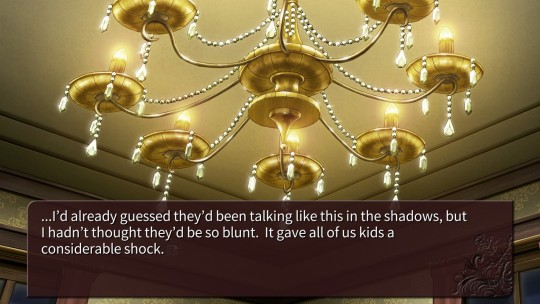
It’s almost like having the fantasy they’d constructed of their parents shattered by the grim truth of reality is a negative thing or something. Someone should write a 1.1 million word visual novel about that idea
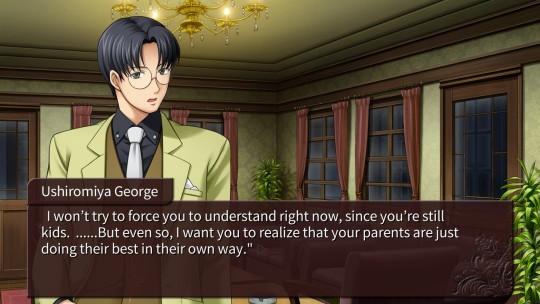
23 year old talking down to a 17 year old moment. It’s always funny how young adults see themselves as full fledged adults rather than kids.
Yeah wow this scene is really going all in on the theme, huh. At first glance, it’s a pretty normal scene of kids being upset that their parents are mad. But really it’s just another proxy of the horrors of truth without kindness.
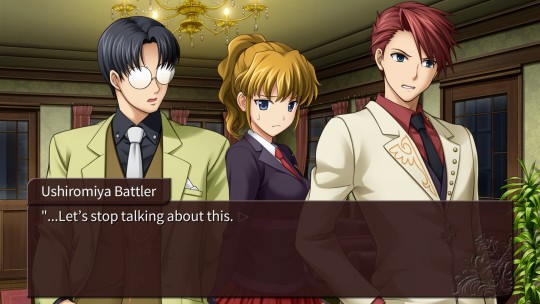
Saving this as a reaction image for whenever Battler says something perverted.
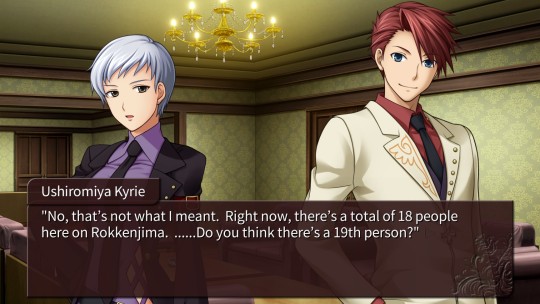
And so our great countdown begins! Honestly one of the coolest parts of the overall mystery of Umineko is going through the motions of there being a potential 19th person on the island, to there only being the known 18, to Kinzo being dead, to Shannon and Kanon being a single person. So, so good.
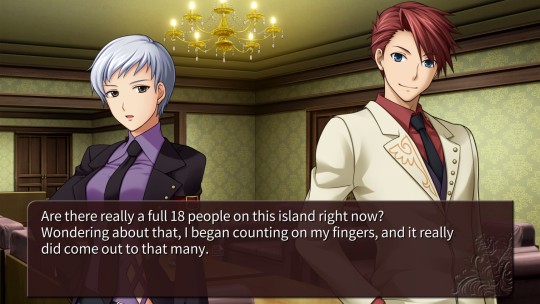
Another one of those lines where Ryukishi definitely smiled to himself while writing it. Yeah, there sure aren’t a full 18 people on the island!
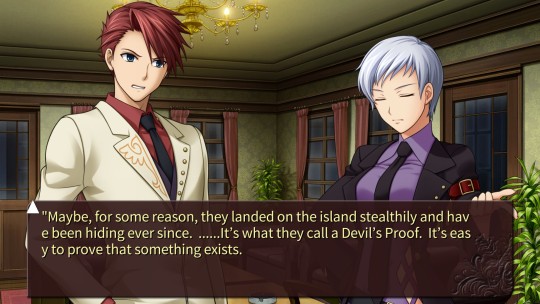
Oh, and here’s our first Devil’s Proof - it’s interesting that Battler is the one to bring it up. I wonder if this is a concept that he discovered on his own, or whether it’s another hand-me-down from Kyrie that he’s grown accustomed to.
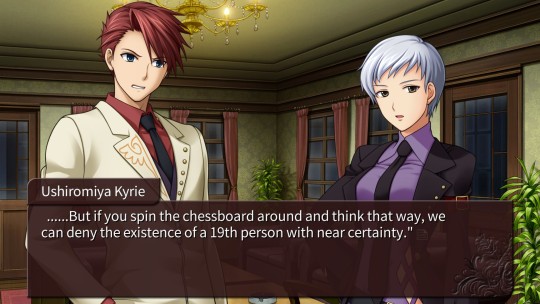
And hey, Chessboard Thinking! I guess this chapter is just “THEY SAID THE THING” central. I suppose that makes sense given this chapter is basically named after the episode title.
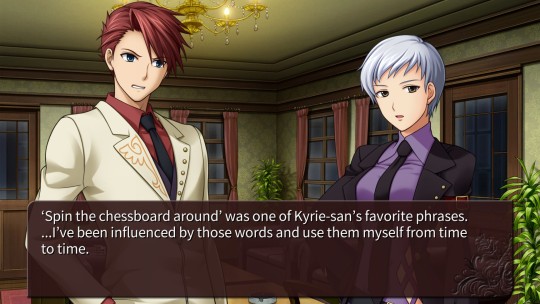
I’m not so fond of it when Ryukishi has a character do something and then immediately use the narrator to talk about them doing it, but this kind of line is really good in my opinion. We picked up on Battler using this type of thinking on the boat in Chapter 1, and now we’re getting confirmation here (several hours later) that it’s something that he picked up from Kyrie. If nothing else, I’m glad that Ryukishi isn’t the kind of writer who’d say this without justifying it elsewhere with an example.
Kyrie caps off this section by saying that her logic is full of holes, but honestly, she lays out a pretty solid deduction. It’s funny how many times someone will get something right and then go “nah that can’t be it”.
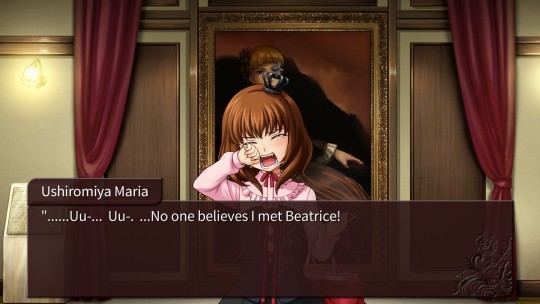
Man, my heart really breaks for Maria here. REALLY liking her more than I did first time round. I kind of want to say that she’s even more upset here than she was at Rosa’s mother of the year moment in the rose garden, which is an interesting look into her psyche if so.
God, the cut back to Kyrie here is stark. A 9 year old is all by herself in the hall, practically traumatised, and here’s Kyrie going “hey she can give us the answers!”
What makes this one interesting, however, is that it’s framed as Kyrie trying to cheer Battler up. I’m… not entirely sure I agree with this being portrayed as a good thing? Like, it’s not a conversation Maria will learn about, so it’s not going to hurt her, but being so lackadaisical to someone else’s suffering doesn’t sit well with me. Don’t get me wrong, I’m the world’s biggest advocate for “Don’t set yourself on fire to make others feel warm”, but I kind of wish there was a little more here about care for Maria’s wellbeing from at least Battler (if not Kyrie). I don’t know, this one just feels a little off.
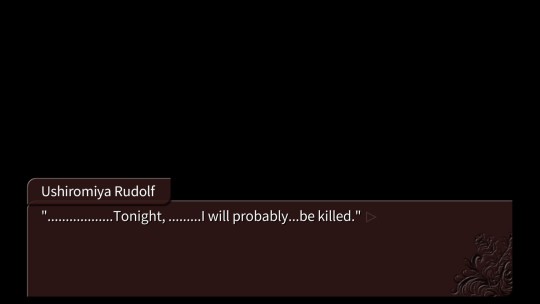
So this is probably going to be my hottest take for the entire reread - but I don’t like this line.
When you read it the first time, it’s a HUGE point of intrigue, and honestly one that causes a lot of readers to perk up and start paying attention. After all, murder mystery, Epitaph talks about sacrifices, and now someone says they’re going to be killed? That’s got to be important.
But the thing is, I feel it’s a little… unwarranted? Like, in hindsight, this line feels way too dramatic. I’d argue it’s unearned, honestly. I’m not dismissing Rudolf’s sentiment behind this line, but given what he’s alluding to - a confession about Battler’s true lineage - it definitely feels like it’s being written unrealistically to make the story seem more mysterious. I just can’t see anyone actually saying this in this specific manner for the given topic.
Of course, a facetious “You’re probably gonna kill me” doesn’t carry the same weight, so trying to find something that keeps the mystery without sounding needlessly obtuse is kind of a have-your-cake-and-eat-it-too situation. I guess I’d opt for something like “There’s something that’s been building up for a while… And it’s gonna come to a head tonight. …Honestly, it’ll be a miracle if I’m still here in the morning.” That’s still a bit needlessly obtuse, but it feels way more natural given the circumstances.
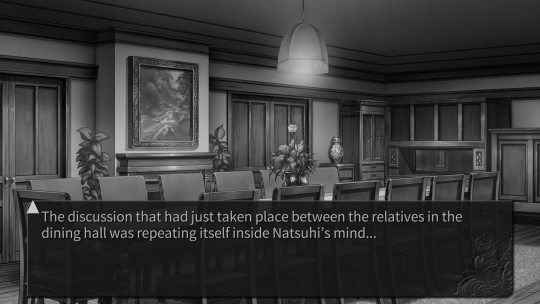
After the earlier observation of “Episode 1 is written with an intent by Yasu to make Natsuhi suffer”, I can’t help but notice it showing up over and over again.
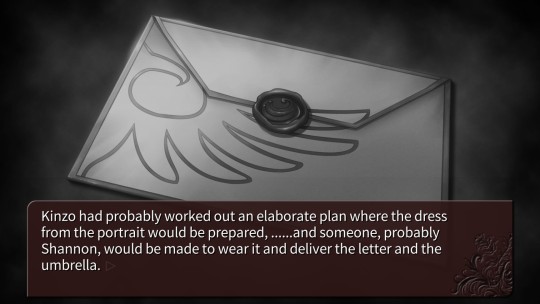
Once again we’re literally telling it as it is. I do wonder how different people would be treating this if it hadn’t first been introduced as Genji dressed up as Beatrice to discredit it.
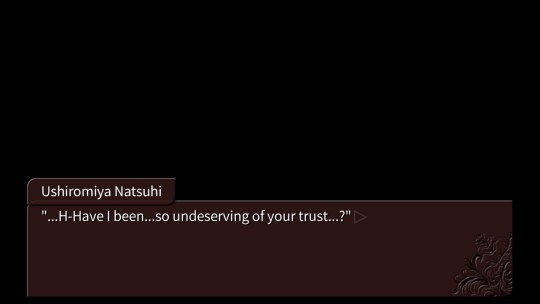
Yeah Yasu is REALLY going in on Natsuhi here. It’s uncanny.
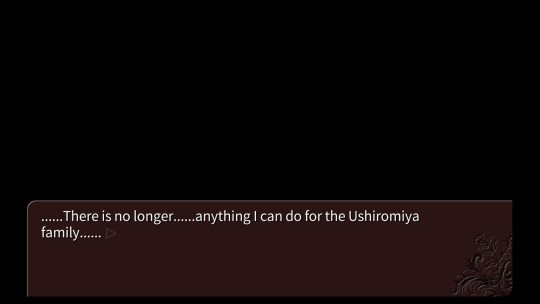
LIKE FOR REAL, ALL IN
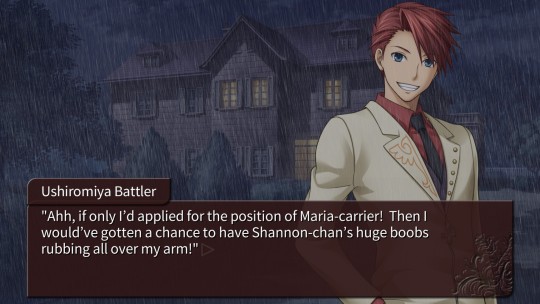
You know, I was about to comment about how tense this scene is, getting everyone into position for the first twilight. Making a point to separate the different groups. And then Battler just has to go and say this, huh.
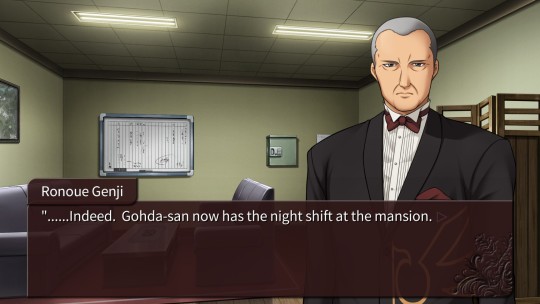
Another scene where both Shannon and Kanon are being addressed independently by Genji. Kind of interesting to think of it as the final meeting for how the night is going to go.
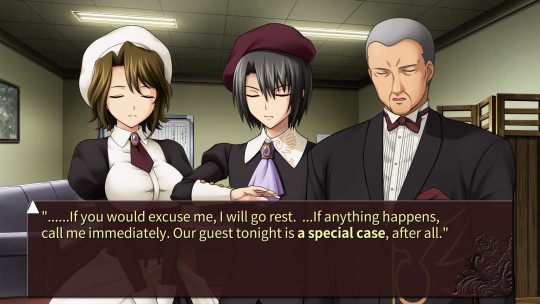
A special case indeed.
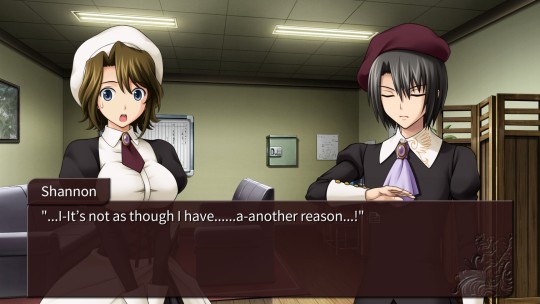
Another win for self indulgent self insert Yasu writing her to be sleeping in the same place as her crush. Next you’ll tell me there was only one bed.
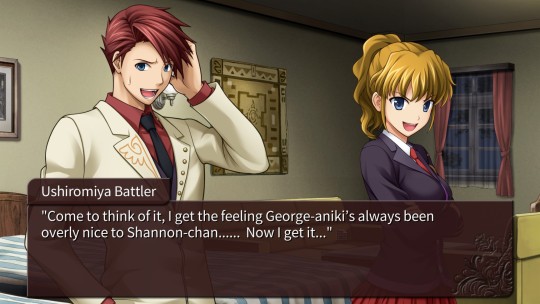
It’s EXCEPTIONALLY funny to have Shannon gushing over Battler, and then the plot IMMEDIATELY misguiding you to George. I legit don’t think there is any way you could even notice this on a first time read unless you were approaching Umineko from an uncannily adversarial approach. Like, I think it’s reasonable to pick up on Kanon potentially liking Battler from the big bulging muscles scene earlier, but unless you’d somehow figured out them both being the same person, I don’t think you’d really be able to pick up on this detail from what you’d already seen from Shannon.
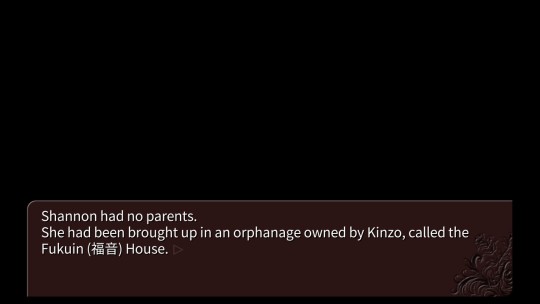
Ah, and here’s the Fukuin name drop. Very funny that the latter part of it is the “on” Kanji once again. I wonder how many more examples of Kanji wordplay we’ll see as hints to the Epitaph?
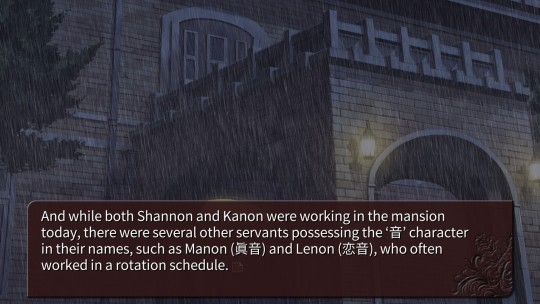
I made a note back in Chapter 3 where I’d forgot about this detail and thought the other “on” servants were additional identities of Yasu. I actually edited that post to respond to a reply about that and address it, in case anyone missed that.
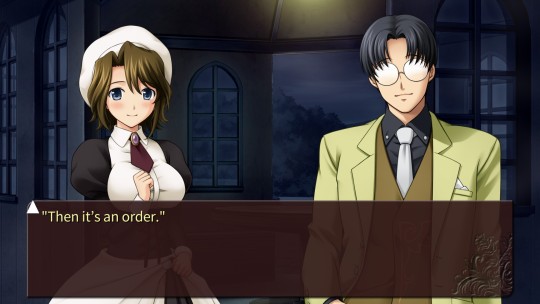
You know, it’s very telling that George’s response to Shannon saying “I would have to obey that request if it was an order, since I’m furniture” isn’t “you’re not furniture”, it’s “that’s an order”. Very romantic.
George’s relationship skills in this scene overall are just pretty creepy. The impression I’m getting is that Yasu is writing this from a space of heteronormativity - by all sensible metrics, George looks like an atrocious partner for her here, but this is the kind of relationship that society wants you to have, right? He’s a rich disney prince here to whisk her away for a happily ever after. She should want this, right? She doesn’t believe that in her heart, but she feels like she should want it, so it’s written out of a place of obligation rather than love.
For some reason I remember Thank you for Being Born playing here, and man, it really isn’t. Pass isn’t a bad song, but man, I do not care for it. Another one that feels overly generic - funnily enough, it kind of reflects the forced heteronormativity by sounding like what “heartfelt confession” music should be without really saying anything special, but I’m almost certain that isn’t intentional.
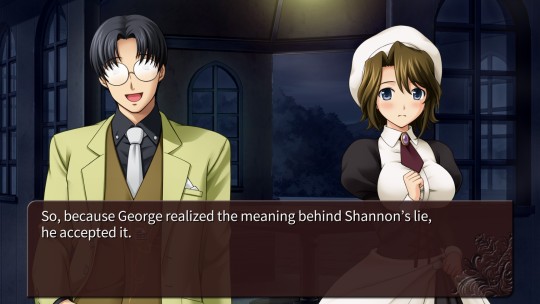
Yeah George? You sure understand the meaning? Not even a hint that there’s something more going on under the surface here?
Really, the most realistic part of Umineko is that I’d also want to kill everyone in my immediate vicinity if George proposed to me.
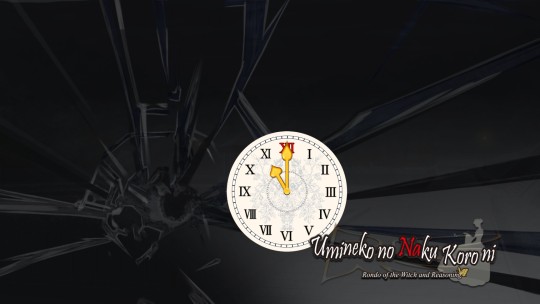
Oh the glass shattering here is phenomenal. Perfect mood setting.
5 notes
·
View notes
Note
Do you believe J2 is romantically involved?
https://at.tumblr.com/magnificent-winged-beast/jensen-ackles-2020-inside-of-you-podcast-w/3ff5rrnhev0z
No, not at all.
Personally I think they are great friends, they kind of grow up together in Supernatural. Well, Jensen did learn to become an adult and got bigger and bulkier till The Boys. The Jarod just grow up taller and went deep in to the forever manchlid persona.
Anyways, J2 it's not my ship. From whatever angle I look at it, I can't see it. Not only because of their characters being brothers and all. It's just not there for me.
From that mentioned link. I can explain that I do believe everyone has the right to ship whomever, and in the spirit of being cool and make peace and love (like Misha and Jackles when in Rome 😉) between the SPN factions. I mentioned that what I thought Jackles was implying, was him giving his blessing to all the ships.
When I started to watch Supernatural from the beginning back in 2005, I wasn't aware about the concept of Shiping.
I was undoubtedly attracted to Dean nearly at the middle of the first season. Jackles made Dean so real and important for me on that show, that from then I was kind of sad Supernatural wasn't about just him, later on, about him and Castiel.
From there, since season 2 to middle 3 it was me just tuning in to watch Dean killing everything with his tall brother dude. Like I said, I wasn't aware of Shiping, and because of my cultural upbringing I thought gay was wrong and a problem. (Aka living in a South American country where machismo is law, and being homofobic is instructed to children).
I got then a brief understanding and crash course about ships because of Sherlock, and here in tumblr. Yes, I'm a Johnlock refugge, but even then I wasn't THAT convinced about those two. Albeit the fan art, and of course Fanfiction get my attention and further understanding and acceptance about my bad education. I started mending fences about my previous misunderstanding of queerness.
While I was on a mental journey about life and everything, hiding in the now questionable Sherlock y stopped watching Supernatural till it was on season 7.
And then one day... 🎶 One magic day they crossed my screen.... 🎶 😂
I kinda stumbled upon Supernatural again and saw new characters and plot. I get on track again watching the thing from the beginning till season 4. My life changed forever 📺😑.
Not only I discovered my new religion and Overlord, I get to really really experience that Shiping thing. And it was beautiful.... ����😳
Dude! Seriously. I was an ignorant, indoctrinated to be just binary or die in shame person. But there was THEM on screen, making me question everything I learned about love ONLY by opposite genders. And discover my own identification, as Mishasexual of course.
At first I thought something was wrong with me and my perception since all the tumblr discovering and "influence". -The gays change me, I thought. I binged watched seasons from 4 to 9 to realize THIS IS REAL!
I then joined the circus and start to paint my face, wear a big red nose, use big shoes and ride a ridiculously small bicycle every Thursday at 8pm central.
It was shocking, how scene after scene, from already aired episodes to the new ones. Once Dean and Cas where together on my screen. I had a vivid experience about the concept of Shiping.
Then I went deep in this hell of a fandom =>affectionately<= 🙄. Watching every Con and panel of Misha.... aaaaand discovered Cockles.
I was doomed.
My life went wham! I questioned everything, from my initial attitude about RLS. That at one point considered as disrespectful and silly because the ones in vogue back then I couldn't understand or believe their very existence.
Once you watched 5 heavy Destiel episodes, and 3 Jibcon Cockles Panels, all the internal homophobia or general confusion about genders changes to rainbows and pink puppies that smell like candy and sound like Misha and Jackles laughing.
Well, I took a deep dive in to memory lane here. Just because a simple J2 Shiping ask. Sorry, but not sorry. I love to spread the Cockles gospel and give the good news about the magical duo that saved me from ignorance, propelled me into the land of trash and rainbows. That occupies 70% of my memory's phone between photos of Misha and them together. Usually of Jackles ogling Mish while having a secret boner.
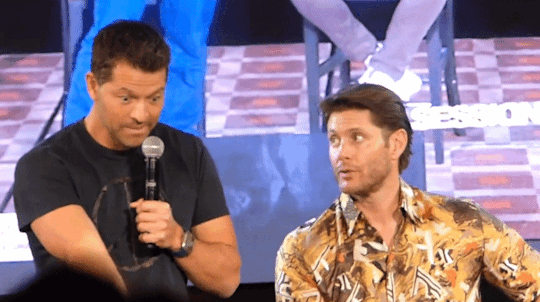
See? A totally random gif of them on my phone.
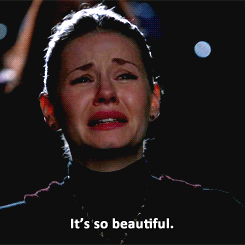
They give me all the emotions. Every feels at once.


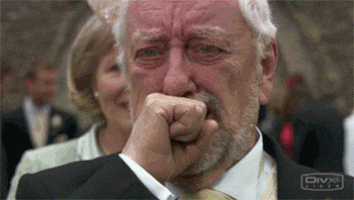


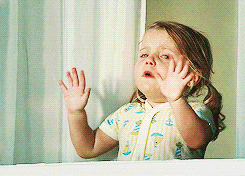
Chaito.

8 notes
·
View notes
Text
Vincenzo full thoughts
I had a lot of it on fast forward in the later episodes because there was so much dramatic slow motion. Overall, the loose threads were tied nicely. The villains got their comeuppance, and it was nice, for once, to see the villain's downfall stretch over 4 episodes, with Vincenzo really savouring every shred he tears from them.
Vincenzo really didn't go soft on anyone in the end. It was nice to see when his tether snapped that his viciousness skyrocketed, which suggests he's been holding back the whole time with Babel until they crossed his line.
"Justice is flimsy and tenuous. Justice will not win against the wretched." Vincenzo isn't a hero. I don't think he even qualifies as an antihero. If anything, he's an antivillain - "a character with virtuous traits who ultimately uses unethical methods". A recurring theme is Vincenzo (and Chayoung) denying that they're fighting for justice. He has an unspoken code of honour: he will protect people who are kind to him, he tries to limit collateral damage, and he will always repay a debt, whether that is charity or revenge.
(Longer ramble underneath cut)
There's a couple of themes I want to discuss. Firstly, Vincenzo - I mean, the clearest change is how Vincenzo softened from stern and icy to being patient and accepting of affection. But I think it was also a learning curve for his convictions. Vincenzo is perfectly clear-eyed about the bloody path he had walked, and as he says in the end, he's never going to be able to correct his path. The Vincenzo who first arrived in Korea wasn't sympathetic to the plight of the poor, but the Vincenzo who left was someone who cared way too much about people who were being forced down by merciless bullies. Vincenzo's growth wasn't just the love and camaraderie and grief he's experienced. It was also him finding his own righteousness - "(justice) is never going to arrive, so I've got a new hobby of taking out the trash".
Second, the cast of Geumga Plaza. I can't remember which episode it was, but one of them said "we used to be so busy trying to make a living that we didn't care about politics", and I think that is such an incisive dissection of the problem. They were each individually highly-skilled, capable and strong-minded people, but for most of their lives they didn't fight back because they were told by society that they are "weak" and powerless to change a system that is unfair to them. I think what is amazing about Vincenzo's later missions is that he couldn't have done most of it without their help - but also their success hinged on the fact that Babel failed to notice the poor people around Vincenzo. They weren't important enough, but these unimportant folks were crucial to Babel's downfall.
Third, the idea of "consigliere". Initially, I thought Vincenzo would have been better if he wasn't Italian. His mannerisms, and his wary distance is very, very East Asian. If he had to be European, then he could've been either German or English. I also wondered why he wasn't just a mafia boss or hitman, especially since the lawyer background wasn't necessary as he couldn't stand in court in Korea. But towards the second half of the series, I think the "consigliere" concept became clearer. It seems like (from the very brief Wiki article) that the consigliere role is that of an adviser, negotiator and problem-solver. And that is what Vincenzo does best. The violence, as he says, is only his second best skill. Vincenzo is good at solving other people's problems, he's good at negotiations, and he's also good at pulling people around him, not necessarily as a leader, but as the central team member everyone wants to trust and support. That's a special skill I don't think even Vincenzo realised he had, because he seemed to have spent most of his life trying to keep his distance from others.
Fourth, the idea of payment and retribution. As hilariously ridiculous as the pigeons descending to save Vincenzo's life was, it was in line with the entire theme of Vincenzo's story. Kindness is repaid with kindness, and crime is repaid with crime. This isn't just in the way Vincenzo treats others, but it is also in the way the others treat Vincenzo. The Geumga Plaza residents are very guarded to start with, but they rally around Vincenzo after he helps them out. Vincenzo's momentary kindness to the pigeon, just like his kindness to people like Hanseo, Ahn and Youngwon, are repaid when he least expects it but most needs it. The story frequently speaks of justice as something nebulous, but this idea of repayment is...in itself, a kind of justice. I think this is also why Vincenzo as an antivillain story actually works, because we see just how far the villains go, and how completely corrupt every branch of the justice system is - from the police to the prosecution to the judge (and the politicians too); in the end, the only path to justice was to take matters into their own hands.
Finally...if you're a 2PM fan, maybe stop reading. Ok Taecyeon was probably the weak point out of the central cast. I think the casting was a stroke of genius, in a way, because he has a natural playfulness and boyish cheer that when juxtaposed with the horrific violence, brings just the right amount of unhinged creepiness. Towards the end, though, his performance got a little...hmm, one-keyed? It's a thing I see with Japanese idols too (I don't watch a lot of Kdrama), they act out an emotion rather than portray a character. Hanseok as the main villain could have had more layers and complexity, and he also didn't quite command the scenes as well as the more veteran actors did, especially in climaxes. He did do a good job on two emotional scenes though, the one where Vincenzo breaks into his apartment to intimidate him and he goads Vincenzo to kill him in front of the cops, and the final scene where he screams for Vincenzo to give him a swifter death.
Overall, I liked this drama. It has its share of flaws. The showdown resulting in Hanseo's death was badly scripted and badly directed. The series could have been shorter and leaner. But as far as an antivillain who is willing to get their hands dirty to do the job - this is probably one of the best stories on that theme I've seen recently...because it's directed where it should be: at the corporations and the bullies who are withholding justice from the populace.
11 notes
·
View notes
Text
Know no shame: queerness in the golden age of TV and piracy
Both Our Flag Means Death and Black Sails go all in on queer pirates — eventually
By Samantha Greer Jun 2, 2022
Our Flag Means Death has become a bit of a sensation, to put it mildly. The show skyrocketed in popularity for weeks after its debut, both in terms of streaming metrics and the outpouring of fan art. That’s in no small part thanks to its centering a romance between two men, Stede Bonnet and Edward “Blackbeard” Teach, which captured the hearts of many, especially among queer viewers starved of on-screen representation. Even as queer representation has improved over the decades, with several ongoing shows featuring queer characters and subplots, it’s still rare for a series to focus squarely on queer romance, especially in genre shows.
Perhaps some of the infatuation stems from how Our Flag Means Death marketed its romance story — namely, it didn’t. Those initial trailers, teasers, and handful of episodes focused on the comedy hijinks of Stede Bonnet and his inept band of pirates. Not so much as a longing glance between Stede and Ed. For an audience more often used to queerbaiting or sometimes no inclusion at all, the shock that this show really was going to commit to that romance seems to have come with much elation, not to mention a viewership which tripled somewhere between its debut and its finale. Even creator David Jenkins has commented on the matter; speaking to The Verge, he said, “I think I didn’t realize — because I see myself represented on camera, and I see myself falling in love in stories — I didn’t realize how deep the queer baiting thing goes. Being made to feel stupid by stories, I guess. […] [L]ooking at how people were kind of afraid to let themselves believe that we were doing that was a surprise to me, and it’s heartbreaking.”
Oddly enough, though, this isn’t the first time a queer pirate show has buried the lede. Though the shows don’t share channels, decades, or even sensibilities, the way they slowly revealed the queerness of their protagonists reveals how both of these shows reflect the different climates in which they were released.
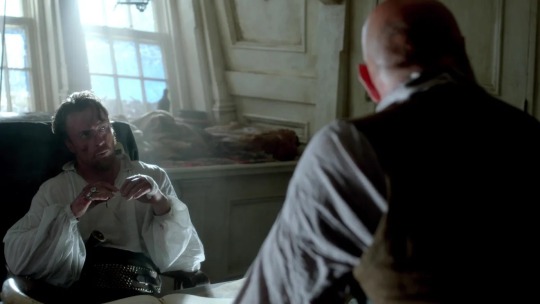
Image: Starz
Black Sails, which premiered back in 2014, is a series that acts as both a prequel to the classic pirate novel Treasure Island and a mishmash of real history. Long John Silver brushes shoulders with real pirates like Charles Vane and Anne Bonny. In spite of any misgivings you might have about its gritty Treasure Island take, it’s a genuinely thoughtful exploration of history and fiction. To be sure, it has its fair share of bloody violence and sex; it was seen as Game of Thrones on the high seas among critics. What it absolutely does not do upfront is let the audience know that one of its central characters (arguably the story’s primary protagonist), Captain Flint, is in fact a gay man, and that his oppression and persecution under British society is the root of his entire violent quest.
In Black Sails this twist serves a purpose, held back until halfway through the second season. Flint, initially an enigma to audiences and his crew alike, is a larger-than-life character — an inscrutable, cunning, and ruthless pirate, much like the character first referenced in Treasure Island. He is allowed to embody a hypermasculinity, the archetypal bloodthirsty captain who will do anything for gold. The reveal that he’s gay and that his mission is to rebel against the British Empire, to create a nation free of its rule, complicates everything he has done and will do, turning him from a mercenary into a revolutionary.
The fact that Black Sails and Our Flag both smuggled queerness into their narratives is made all the more interesting when considering the real-life parallels of the characters. Both shows play with our conceptions of history and well-known figures. Stede Bonnet and Blackbeard really did hang out, and the show simply makes a leap as to why that could be; Jenkins has explicitly said he’s interested in treating recorded history as merely a jumping-off point. After all, it’s unclear how much he’s even reading into their relationship. To this day, there’s a lot of debate about how much queerness has been exorcised from records and accounts, either by omission or by individuals’ own necessary discretion.
Retelling well-known histories as queer tales is more about putting back into our past what has been erased from it. As Black Sails co-creator Jon Steinberg said to Den of Geek regarding the show’s historical figures, “There’s some freedom in the moment you realize that the historic record is severely compromised in terms of what these peoples’ lives were like. They had a motive to lie, and so did the people in London. [...] It gives us the room to try to tell a story that will hopefully feel real. It probably won’t necessarily match up to the textbook to what happened, but I think we would probably argue that the textbook is already a narrative that somebody with an agenda put together a long, long time ago.”
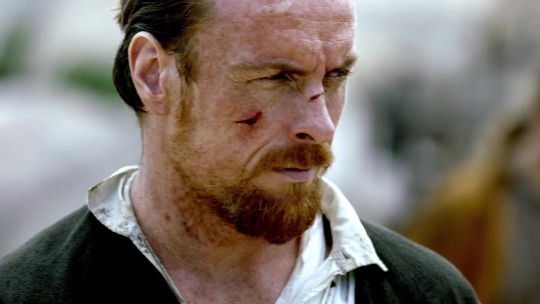
Image: Starz
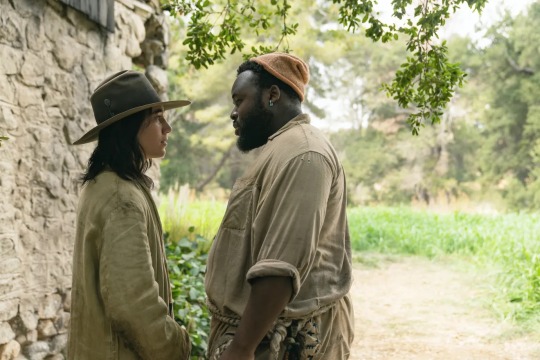
Photo: Aaron Epstein/HBO Max
Not that it’s hard to read queerness into existing histories, even if the terminology and conception of the ideas differed at the time. Romanticized pirates have always been portrayed as camp, an image perhaps spurred on by historical figures like Jack Rackham, nicknamed Calico Jack on account of his colorful outfits (who also makes an appearance in OFMD). Mary Read spent a portion of their life under the name Mark Read, and whether it was simply a disguise or fluid gender expression or if they were even trans, it lends itself to storylines like that of Jim on Our Flag Means Death. Accounts of Blackbeard spending all of his time with Stede Bonnet can so easily be understood through a queer lens that it’s shocking no story put such a twist on these figures before Our Flag Means Death.
But the answer to why no one had might be captured somewhat in the response to Black Sails’ own voyage into queer storytelling.
To be fair, Black Sails does have queer characters from the outset — two women, Eleanor and Max — but the first season generally presents them under a leering male gaze, seemingly intended to titillate general audiences. The show’s interest in the revolutionary qualities of queerness didn’t take center stage until its second season. While it spawned a fervent following among some queer fans, it equally drew the ire of homophobes who felt betrayed by the reveal that half of the cast was queer. Reddit is littered with rants against the show’s “gay agenda” by lads who thought they were getting a show “just about pirates,” all part of an outcry that even got Flint’s actor, Toby Stephens, to comment. “Before the revelation I had this huge following from guys, but as soon as that happened it was like they had been betrayed. It was the sense of utter betrayal and I wasn’t surprised because I knew it was going to be a massive thing.” The degree of discomfort among men, that simply by being gay Flint no longer adhered to their rigid standard of a male icon, is hardly something that’s gone away.
In the present, though, the TV landscape has changed considerably since Black Sails aired. Streaming services have come to rule the roost and fracture the monoculture, and the pandemic has only further shaped that. Black Sails had to compete against The Wire, The Sopranos, and Game of Thrones to earn its place at the table. For Our Flag Means Death, which is much more a comedy than a drama (and not at all an epic genre TV series, though there are still plenty of old-fashioned stabbings), things are a little different.
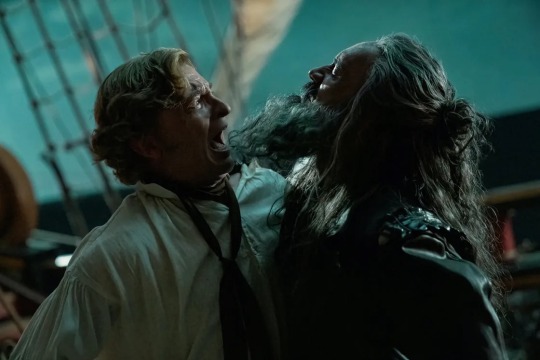
Photo: Aaron Epstein/HBO Max
While the special effects (the revolutionary StageCraft developed for The Mandalorian) that allow Our Flag Means Death to seem like it’s taking place at sea would have been reserved for much higher-budget shows only a few years ago, they’re a flourish for a series that largely takes place on small sets. It could’ve been a tiny budget sitcom a decade ago. That smaller scale may be what allowed it to take risks that, sadly, still feel daring in 2022. It’s not just a romance between Stede and Edward but an entire cast full of queer characters — a queerness that in its own context largely feels unremarkable, with the crew quietly tolerant and respectful of each other throughout the series.
In the last few years things have moved along, but even still, both shows had to operate under the very conditions of which they’re critical. As America and the U.K. both ramp up in homophobia and transphobia, with legislation seeking to target those vulnerable groups, the stories of Black Sails and Our Flag Means Death don’t feel like purely historical stories. They’re tales of the here and now. Pirates are a way to recontextualize those who society “others,” who are made outcasts and fringe by the mainstream. The shows invite us to ask why someone would choose to live on the edge, to unpack their histories and motives until their popular image is vanquished. To take the most well-known of pirates and to reframe them as traumatized queer outcasts is not intended as a historical rewrite but as a rebuttal of the very idea of a history written by the conquerors.
The British Empire present in both stories is depicted as an entity that is, at its worst, all-consuming barbarism and, at its best, all-consuming barbarism propped up by a veneer of civility. It’s an entity that not only destroys but warps reality around itself, reshaping history in its likeness.
In our present, queer people are once again being miscast as villains and boogeymen. In a way, Black Sails and Our Flag Means Death always dance on the edge of tragedy. Either they meet the same ends as their historical counterparts or we see the bittersweet truth of stories that are written out of history, their actions twisted into something evil. By giving that other perspective, by suggesting another account, these shows are a rallying cry for queer folk looking for their place in a world that doesn’t want them to exist at all — and a reminder to everyone who stands against us which side of history they’re on.
Article source: Polygon
214 notes
·
View notes
Text
Know no shame: queerness in the golden age of TV and piracy

Both Our Flag Means Death and Black Sails go all in on queer pirates — eventually
[Editor note: This post contains light spoilers for Black Sails and Our Flag Means Death]
Our Flag Means Death has become a bit of a sensation, to put it mildly. The show skyrocketed in popularity for weeks after its debut, both in terms of streaming metrics and the outpouring of fan art.
That’s in no small part thanks to its centering a romance between two men, Stede Bonnet and Edward “Blackbeard” Teach, which captured the hearts of many, especially among queer viewers starved of on-screen representation. Even as queer representation has improved over the decades, with several ongoing shows featuring queer characters and subplots, it’s still rare for a series to focus squarely on queer romance, especially in genre shows.
Perhaps some of the infatuation stems from how Our Flag Means Death marketed its romance story — namely, it didn’t. Those initial trailers, teasers, and handful of episodes focused on the comedy hijinks of Stede Bonnet and his inept band of pirates. Not so much as a longing glance between Stede and Ed. For an audience more often used to queerbaiting or sometimes no inclusion at all, the shock that this show really was going to commit to that romance seems to have come with much elation, not to mention a viewership which tripled somewhere between its debut and its finale. Even creator David Jenkins has commented on the matter; speaking to The Verge, he said, “I think I didn’t realize — because I see myself represented on camera, and I see myself falling in love in stories — I didn’t realize how deep the queer baiting thing goes. Being made to feel stupid by stories, I guess. […] [L]ooking at how people were kind of afraid to let themselves believe that we were doing that was a surprise to me, and it’s heartbreaking.”
Oddly enough, though, this isn’t the first time a queer pirate show has buried the lede. Though the shows don’t share channels, decades, or even sensibilities, the way they slowly revealed the queerness of their protagonists reveals how both of these shows reflect the different climates in which they were released.
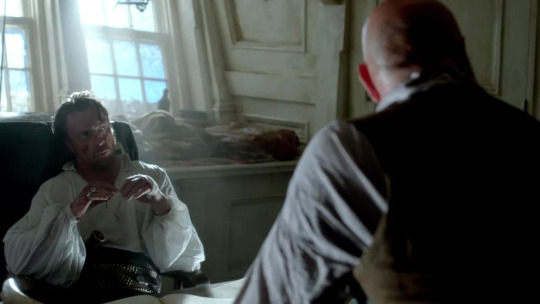
Black Sails, which premiered back in 2014, is a series that acts as both a prequel to the classic pirate novel Treasure Island and a mishmash of real history. Long John Silver brushes shoulders with real pirates like Charles Vane and Anne Bonny. In spite of any misgivings you might have about its gritty Treasure Island take, it’s a genuinely thoughtful exploration of history and fiction. To be sure, it has its fair share of bloody violence and sex; it was seen as Game of Thrones on the high seas among critics.
What it absolutely does not do upfront is let the audience know that one of its central characters (arguably the story’s primary protagonist), Captain Flint, is in fact a gay man, and that his oppression and persecution under British society is the root of his entire violent quest.
In Black Sails this twist serves a purpose, held back until halfway through the second season. Flint, initially an enigma to audiences and his crew alike, is a larger-than-life character — an inscrutable, cunning, and ruthless pirate, much like the character first referenced in Treasure Island. He is allowed to embody a hypermasculinity, the archetypal bloodthirsty captain who will do anything for gold. The reveal that he’s gay and that his mission is to rebel against the British Empire, to create a nation free of its rule, complicates everything he has done and will do, turning him from a mercenary into a revolutionary.
The fact that Black Sails and Our Flag both smuggled queerness into their narratives is made all the more interesting when considering the real-life parallels of the characters. Both shows play with our conceptions of history and well-known figures. Stede Bonnet and Blackbeard really did hang out, and the show simply makes a leap as to why that could be; Jenkins has explicitly said he’s interested in treating recorded history as merely a jumping-off point. After all, it’s unclear how much he’s even reading into their relationship. To this day, there’s a lot of debate about how much queerness has been exorcised from records and accounts, either by omission or by individuals’ own necessary discretion.
Retelling well-known histories as queer tales is more about putting back into our past what has been erased from it. As Black Sails co-creator Jon Steinberg said to Den of Geek regarding the show’s historical figures, “There’s some freedom in the moment you realize that the historic record is severely compromised in terms of what these peoples’ lives were like. They had a motive to lie, and so did the people in London. […] It gives us the room to try to tell a story that will hopefully feel real. It probably won’t necessarily match up to the textbook to what happened, but I think we would probably argue that the textbook is already a narrative that somebody with an agenda put together a long, long time ago.”
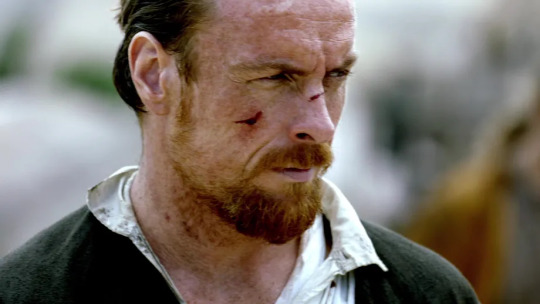
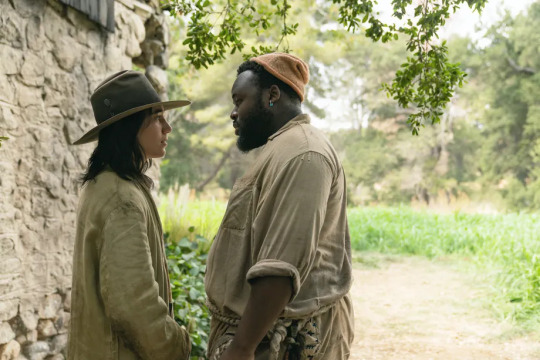
Not that it’s hard to read queerness into existing histories, even if the terminology and conception of the ideas differed at the time. Romanticized pirates have always been portrayed as camp, an image perhaps spurred on by historical figures like Jack Rackham, nicknamed Calico Jack on account of his colorful outfits (who also makes an appearance in OFMD). Mary Read spent a portion of their life under the name Mark Read, and whether it was simply a disguise or fluid gender expression or if they were even trans, it lends itself to storylines like that of Jim on Our Flag Means Death. Accounts of Blackbeard spending all of his time with Stede Bonnet can so easily be understood through a queer lens that it’s shocking no story put such a twist on these figures before Our Flag Means Death.
But the answer to why no one had might be captured somewhat in the response to Black Sails’ own voyage into queer storytelling.
To be fair, Black Sails does have queer characters from the outset — two women, Eleanor and Max — but the first season generally presents them under a leering male gaze, seemingly intended to titillate general audiences. The show’s interest in the revolutionary qualities of queerness didn’t take center stage until its second season. While it spawned a fervent following among some queer fans, it equally drew the ire of homophobes who felt betrayed by the reveal that half of the cast was queer. Reddit is littered with rants against the show’s “gay agenda” by lads who thought they were getting a show “just about pirates,” all part of an outcry that even got Flint’s actor, Toby Stephens, to comment. “Before the revelation I had this huge following from guys, but as soon as that happened it was like they had been betrayed. It was the sense of utter betrayal and I wasn’t surprised because I knew it was going to be a massive thing.” The degree of discomfort among men, that simply by being gay Flint no longer adhered to their rigid standard of a male icon, is hardly something that’s gone away.
In the present, though, the TV landscape has changed considerably since Black Sails aired. Streaming services have come to rule the roost and fracture the monoculture, and the pandemic has only further shaped that. Black Sails had to compete against The Wire, The Sopranos, and Game of Thrones to earn its place at the table. For Our Flag Means Death, which is much more a comedy than a drama (and not at all an epic genre TV series, though there are still plenty of old-fashioned stabbings), things are a little different.
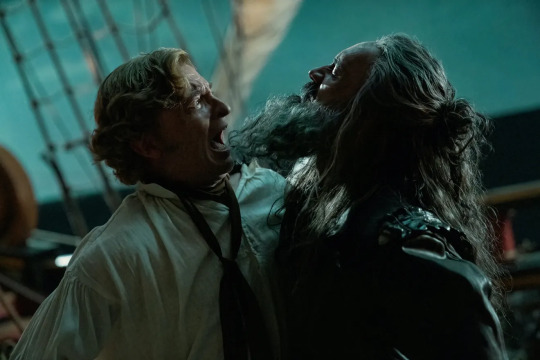
While the special effects (the revolutionary StageCraft developed for The Mandalorian) that allow Our Flag Means Death to seem like it’s taking place at sea would have been reserved for much higher-budget shows only a few years ago, they’re a flourish for a series that largely takes place on small sets. It could’ve been a tiny budget sitcom a decade ago. That smaller scale may be what allowed it to take risks that, sadly, still feel daring in 2022. It’s not just a romance between Stede and Edward but an entire cast full of queer characters — a queerness that in its own context largely feels unremarkable, with the crew quietly tolerant and respectful of each other throughout the series.
In the last few years things have moved along, but even still, both shows had to operate under the very conditions of which they’re critical. As America and the U.K. both ramp up in homophobia and transphobia, with legislation seeking to target those vulnerable groups, the stories of Black Sails and Our Flag Means Death don’t feel like purely historical stories. They’re tales of the here and now. Pirates are a way to recontextualize those who society “others,” who are made outcasts and fringe by the mainstream. The shows invite us to ask why someone would choose to live on the edge, to unpack their histories and motives until their popular image is vanquished. To take the most well-known of pirates and to reframe them as traumatized queer outcasts is not intended as a historical rewrite but as a rebuttal of the very idea of a history written by the conquerors.
The British Empire present in both stories is depicted as an entity that is, at its worst, all-consuming barbarism and, at its best, all-consuming barbarism propped up by a veneer of civility. It’s an entity that not only destroys but warps reality around itself, reshaping history in its likeness.
In our present, queer people are once again being miscast as villains and boogeymen. In a way, Black Sails and Our Flag Means Death always dance on the edge of tragedy. Either they meet the same ends as their historical counterparts or we see the bittersweet truth of stories that are written out of history, their actions twisted into something evil. By giving that other perspective, by suggesting another account, these shows are a rallying cry for queer folk looking for their place in a world that doesn’t want them to exist at all — and a reminder to everyone who stands against us which side of history they’re on.
Source: Polygon
21 notes
·
View notes
Note
Why do you think from a narrative point of view, Tam never taught Rand swordsmanship. Obviously he's got his war trauma and didn't want to steer his son toward war, and an author doesn't want his protagonist to be too competent at the outset (but he could always invent worse threats), but Rand masters his sword as he learns channeling, making it sort of redundant. What does it do for the character to be learning the sword in the early books, instead of knowing it when the story starts?
Something we see threaded through the story at various levels and in various ways throughout Wheel of Time is the interplay between change, identity, and cycles of repetition or theme-and-variation. And within those, the questions: what happens when you are confronted with something for which you are utterly unprepared? Who are you, and what does that mean when everything that contexualised it changes? What is lost, and what remains, and what ultimately comes full circle, and how?
At the largest scale, you have the world itself in this setting's concept of cyclical time and repeating Ages and the tension between stasis and change, inevitability and choice. Within that framing, we are given a past Age in which the concept of war was unknown, and society flourished, and all lived in a garden of innocence -- until that world is confronted with a darkness for which it previously had no name, and conflict for which it was wholly unprepared, and an enemy against which it was not competent to fight, despite all its brilliance elsewhere.
Then you have the Aiel, as we step fractal-like through the variations on this theme at different scales. The journey we see of their identity as it becomes almost opposite to what it once was, all but unrecognisable save for a central core of endurance and determination, and a single tenet - to never wield a sword - as a fixed point but in a context that changes so greatly as to render even that throughline of identity almost unrecognisable. And then as we move into the final phase of the story, further schisms and changes and revelations that bring them back to something almost resembling who they were when we first met them - but also changed, and approaching that point from a very different direction. Who are they, who call themselves Aiel? What does that identity mean? What parts of it do they keep, in their story of being confronted over and over with a world that changes from generation to generation, and demands of them something they are wholly unprepared to face, or to be?
A world, a people... and now, a character: the farmboy who has to become the saviour of the world, and somehow not lose himself along the way. A boy untaught in the ways of war, with hands callused by the ploughshare rather than the sword. An innocent, from a place that has largely forgotten the notion of war as more than an abstract. Like the world of the second Age, or the original Da'shain Aiel: the shepherd, Rand al'Thor. And then change comes, comes and places that sword in his hands and that power in his spirit and that far too heavy weight on his shoulders. Inevitability comes, and takes him from that land and from that person he was and demands something else of him, something far too much and something for which he - like the world of he second Age or the original Da'shain Aiel - is entirely unprepared, and yet something against which he cannot fight without dooming them all. And so the questions are asked of him throughout this story: who are you, when this is what you must become? What remains of the shepherd, when the world demands a saviour? How do you make the apple trees bloom, when your hands have had to learn the shape of blade and power and war and death?
So I think in part it's along the lines of what you said - this question of initial competence - but informing that is also the idea of what happens if you take a farmboy, an innocent, just a person no more and no less, and place that task and weight upon them. But it's not just about skill; it's about the identity element of it as well. It's about he only wanted to sit, and remember a shepherd named Rand al'Thor. It's about not just the struggle to learn those skills, but the very fact of their necessity, and reconciling that against who you thought you were. And then, so many steps later down that path, trying to retrieve some of who that person was, some of that version of yourself, when all innocence has long been lost and when you have the power at your fingertips to break the world and command kings and determine the fate of everyone. It's about a starting point, yes, but also something to, in those final days, look back on and draw from.
A Rand who begins the story already knowing the basics of the sword is a Rand who is, practially, just that little bit more prepared in both skill and psyche for what he must later become -- but also who is, symbolically, that one step less removed from the personification of a world before war, a people before violence (the Dragon is one with the land, after all).
Could you make the story work without Rand ever learning the sword at all? Yes, probably. Focus it more on his discovery of and conflict with and eventual mastery of channelling, and you could achieve much the same end. In that regard, I think the sword is largely there for the genre and the element of cool, and as another marker of skill gained... but I think it's also there as a symbolic marker of innocence lost, and of how Rand's path is forced from ploughshare to sword, and the almost insurmountable struggle of then trying to find a way back, or a way to reconcile the two, before all that remains of the shepherd is lost.
#wheel of time meta? on MY blog?#it's been a while#wheel of time#rand al'thor#anyway i'm not sure this actually directly answers your question#but hopefully it makes sense#i just like to think about how some of these themes play out in fractal#similar stories happening on the scale of a world and a people and a character#and this is far from the only example of that#asks#anon
111 notes
·
View notes
Text
[Image description: Four screenshots of text from the linked article. The text is transcribed below.
Image 1: There were three of us in the game — Robert as the game master, me as Chester McLaine and Argo as Mack “The Torso” Torsson. In the first session we were different characters, I was Trinidad Tranquille, a young communist given time off work due to excessive violence and Argo as some petit bourgeoisie type guy whose name I don’t remember — anyhow we both died while trying to stop the initial attack on the station, which was in those bygone days carried out by the Religion of Evil type guys. Trini was a cool guy though. He worked at a meat shop that belonged to Carson Torsson, Mack Torson’s dad, and had a system of stealing from work in order to ‘adequately compensate for his labour’. He also liked to practice a crude type of critical theory in the vein of ‘this building has been made that large to humiliate me, to show off with a power greater than me, to scare me into submission’. And he had a system of smoking no more than five cigarettes per day to cut down on smoking costs — Kim’s single cigarette habit might be a distant echo of that. He had, I think, a 7 in PSY (at least 5) and 2 in INT and mediocre physical stats, the core system was pretty much set by then.
Image 2: Well anyhow, a role playing game set in a fairly realistic setting gives fairly realistic results on human behaviour. Torsson and McLaine would both abuse their power. Torsson would hold grudges. McLaine would forfeit a possibility to get new gear in order to do a favour for a new policeman. They would both participate in abuse and exploitation of Chad Tilbrook, an officer junior to even them. And they didn’t even think they were abusing their power. They were fulfilling important objectives by getting guns and drugs for the big revenge operation and they did it in a handy manner and they didn’t think that they are abusing the unconscious body of the Toothless Armataur as the racist myth said this race will regenerate from pretty much anything. McLaine was also way too stupid to concentrate on the main plot and the politics of the police station. McLaine was a sword guy — back then it was still a guns AND swords universe due to swords being cool and guns being crappy and taking a lot of time to load. Torson was an idiotic body builder and a major admirer of Lieutenant John “The Archetype” McCoy who was our Station’s resident mass murderer — “but they were all really bad” — Station 41 was known as “the bloody murder station” and no one saw it as an abnormality, really. The interrogation of one of the bad guys, a morbidly obese local religious figurehead, had actual mutilation torture in it and I believe it was ultimately unsuccessful as he just retreated ‘into a happy place inside his head”, and the bullet-lobotomized officer Damien “44” Latrec was the only one to call it torture (enthusiastically). And you don’t pay it much mind. Instead, Torson thought about stuff like how to get it on with the captain’s secretary and tattooing the word ‘Jamrock’ on his body hundreds of times over and McLaine thought about stuff like ‘what the hell is going on with the armour maker or Nix Gottlieb’, put a lot of stock into being a communist memebot and loved the captain uncritically.
Image 3: I think Torson and McLaine lived with each other and also with two other young cops, Sundance Fischer and Elfboy Williams, to cut the living costs. Elfboy’s thing was being the dexterity bro, in which he continually lost to McLaine and Sundance’s thing was having a fat ass and cleaning his guns all the time. Communal living is a thing we have done, on and off, for most of our adult lives, although at the time of playing the Torson and McLaine game we had not yet started with that.
Image 4: Which brings us to another central concept of the Jamrock campaign, namely that the cops are also a gang and the gangsters are also cops. The first is rather apparent in the light off the BLM movement, the second should also be rather intuitively understood as criminals hold some amount of power, have to be organized about it and thus have to enforce a set of rules — I have heard from a friend that knows about these kinds of things that the public is to a degree protected by the criminal underground and their customs — that it could be worse than it is, and of course it can — Estonia is generally a sleepy and silent place without gunshots or mass riots. A gang is also an interesting social formation because it is such a simple one, even children can put one together, and they often do. In the Eastern Block’s XX century children’s literature it is a staple that school-age boys are playing “Indians” and those Indians most often have military structure and discipline. Campaigns set in the Elysium world owe an enormous amount to classic youth literature — and I may have to remind the Western reader that classic Eastern block children’s literature has stuff in it like ‘an absent-minded scientist type looking for his glasses in a pile of dead bodies murdered by the government after a food protest or something’ (J. Olesha, The Three Fat Men) — though when you think of it, Tom Sawyer also had death in it.
End ID.]




So. This is probably old news to anyone that’s been into the game longer than like two weeks BUT 😔 I’ve been slowly looking through some of Martin Luiga’s articles on the creation of DE and everything’s been really interesting and cool so far. I haven’t come close to looking at everything yet but the little tidbits here on the early development of Elysium as a setting and the ongoing themes of police brutality/corruption that DE would draw so heavily on really caught my eye. From here
736 notes
·
View notes
Note
Hi Leah 💜 this is something I've been pondering for a while and I would def be interested to get your take. It seems like, both within canon and within the fandom, it is pretty much accepted that Elliot needed to make the choices he made *for his family* and that remaining in (and returning to) his marriage to kathy, even if he loved Olivia, was what cemented his status as a family man. It's odd to me because svu, while it def has its flaws, has been relatively progressive on social issues, yet it really pushes this "stay together for the kids" dynamic despite the fact that that's really going out of vogue in the progressive mainstream. I understand Elliot would absorb this from his catholic upbringing, but Olivia going along with it (especially in a lot of fanon) is so odd to me, especially given that the ultimate expression of elliots devotion to his family was...leaving the majority of hus children behind to raise the fifth abroad. Thoughts?
y'all really making me use the old thinker today huh lmao
ok so here's the thing, right, is that i think there's a big difference between the morals the show tries to preach, and the individual choices each of the characters make. characters should be messy, and at times at odds with the values of the show overall, bc they're supposed to be people.
the show is progressive on moral issues. so why elliot's insistence on staying together for the kids?
well, first up, i don't think he was trying to stay in that marriage for the kids. it's kathy who left him. they didn't come to an understanding, he isn't written as having been unhappy with her; she was unhappy with him, and she left. i think he internalized it as his fault. and he clearly did not want to be divorced, initially; if we look at the way he reacts in the immediate aftermath of the separation in doubt, if we look at his behavior in burned, where elliot finally signs the papers, the way he relates to the man cut out of his family, the way he talks of love, i think it paints a picture of man who doesn't just think he ought to have stayed in a marriage he didn't want for his kids. i think it paints a picture of a man who wanted that marriage, who is grieving for the loss of that marriage.
he and kathy got married at seventeen, said their vows - which matter deeply to elliot, as a catholic - and stayed together for a long long time. she was a central facet of his life. kathy was important to him. they start talking about him moving back home before he sleeps with her in annihilated; he signed the divorce papers for her but he's having drinks with her, basically dating his own wife, and talking about coming home, and it never felt, to me, like he was only doing it for the kids. it never felt like he was suffering through these attempts to correct things bc being with the kids was what mattered; he wanted Kathy. he goes to check on the kids in annihilated and kathy invites him to stay and he jumps at the chance; the kids are asleep. he wanted to fuck his wife.
now in screwed it looks like he's about to tell kathy that he doesn't think they should get back together, but then she drops her bombshell and he goes home. that, to me, is the ultimate expression of his devotion to his family; it appeared he had finally decided to let go, but bc kathy could not raise the kids they already had and a baby on her own, he goes home to help her. she asks him to come home for her. and he does. he sees what she needs from him, he thinks of what the new baby will need from him, and he sacrifices his own desires for that.
now, as to why olivia fights so hard to sustain that family unit, when olivia is a pretty fundamentally progressive woman, i think we have to remember that liv has a pretty fucked up relationship with the concept of family.
she told elliot all her life, all she ever wanted was to be part of a family. she cares for him, deeply, but from the moment they met he was a devoted husband and father. a good husband and father. olivia didn't grow up with a dad, didn't grow up with a family, and she wanted it, and here's elliot, proving that those things she wants are real. that the dream she's carried for so long can come true, just not for her. family is for other people. in the last episode we heard lindstrom remind her that olivia herself believes happiness isn't in the cards for her, and so i think it's no real stretch to believe that she fought so hard for elliot's family because she never thought she'd have one of her own. someone out there deserved to have a family. those kids, they deserved to have a father. elliot, he deserved to be loved, to be happy, and she associates family with happiness and love. therefore, she's not gonna do anything to fuck up his family; she's gonna try like hell to preserve it, at her own expense. because she loves him, she wants his family to be whole.
would he have been the man she loves, if he was not selfless when it came to his family? would she have loved him, if he turned aside from them for her sake, if he didn't put them first? i don't think so.
and i don't think his family is the only, or even the main, reason why he chose to leave.
elliot had just killed a child. he's got a daughter around her age. there is no universe in which that does not haunt him, and that is not like the other times he was forced to kill someone in the line of duty; he felt responsible to Jenna, he felt he should have protected her, and he felt like he let her down, and he killed her. that alone is sufficient cause, in my mind, for him not to come back; that he no longer trusts himself to do this work, that he cannot continue to hurt and be hurt by this job. add in the hoops IAB was gonna make him go through, and it becomes untenable. His pension was on the line; with five kids - now the oldest two are probably done with college at that point, or close to it, but the twins would have been getting in the early days of college and Eli would have been a toddler - to look after, and a wife who depends on him, when Elliot has probably spent his whole adult life thinking he and Kathy were gonna rely on his pension for their retirement, losing that would have been devastating. that's a major threat to his family's future, but to his own future, too. so i don't think that was all about the family. and i believe what he told olivia in rotps; that he did not speak to her bc he knew she would change his mind. i don't see that as him sacrificing a possible future with her for the sake of his family, though; i see that as him having decided he can no longer continue down this path, and being afraid of what would happen to him if he went back, and knowing he'd go back for her. not even if she asked him to; just if he heard her voice. she means so much to him, he thinks he'd destroy himself just to be near her.
18 notes
·
View notes
Text
I finished World’s End Club
The hardest thing about completing a Kodaka or Uchikoshi game is always that bereft feeling; the knowledge in my heart that there’s nothing out there that will fulfill me as much as these guys’ stories do, and now I’m fresh out of their stuff once more. Y’know? It’s like “Well shit, now I have to settle for something lesser.”
Anyway. I finished World’s End Club. The whole thing took about 16 hours (according to the in-game clock on my save file), and I’m currently redoing a couple of stages for stickers that I missed. I doubt that’ll last me more than another hour, though, so I should be 100% finished at 17 hours. Granted, that’s with me bypassing the first hour because I’d already completed it in the demo... so that makes it around 18 hours long in total. Much shorter than the average Uchikoshi or Kodaka work, clearly!
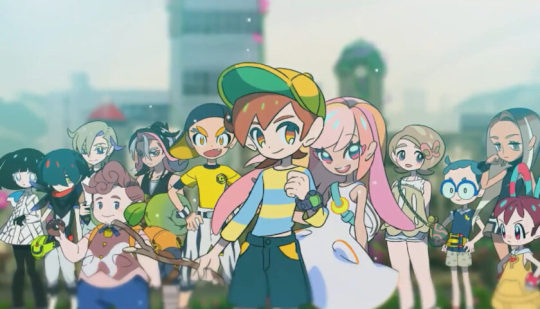
And man, they sure do pack a lot of twists and turns into those 18-or-so hours. Admittedly, there is time to slow down and talk to the characters to learn more about their backstories or what they’re thinking (typically during “Camp” scenes). But the other two types of scenes — “Story” and “Act” scenes — are chock-full of new reveals or weird plot developments up until like, hour 15. It’s all of the usual twistiness of an Uchikoshi story compacted into a shorter timeframe.
In addition to this being shorter than Uchikoshi’s or Kodaka’s most notable prior games, it’s also much lighter. Despite somewhat dark themes cropping up at a few points, this is a far kinder and more uplifting game than Zero Escape or Danganronpa ever were. I mean, hey, it’s about a group of 12-year-olds, so it almost necessitates that lighter tone.
I’ve mentioned this before, but I love the core cast of kids. Sure, there are a few of them who remained thin enough that I never got very attached to them, but I mean, it’s a pretty big cast. Most of the storytelling time is spent on the central plot, so I understand the shorthand of using some stereotypes in there. Some of them do get mined for depth. If there’s one problem with them, it’s that they’re too young for me to feel comfortable shipping any of them. :P They’re BABIES!

The bottom line here is that I loved the latest Uchikoshi-penned ride. I will remain in the tank for his works for a long time to come. But now, In order to actually list and go off on some of my (relatively few) gripes with the game, I have to get into Spoiler Mode.
MAJOR SPOILERS BELOW THE CUT!
SPOILER MODE ACTIVATED
Look; I didn’t love all of the twists thrown at us. I can come up with workarounds for some of the ones that bugged me, but let me go off on which twists most irritated me and why, okay?

First off, the reveal that all of the strange monsters and creatures were just “illusions” doesn’t make any sense. If they were just illusions, there’d be no physicality to them. So there’d be no way that a giant pillbug could abduct Pai, or that some Yetis could run off with Pochi or Yuki. So they’re very obviously NOT just illusions. Hell, while we’re at it, maybe we should inquire as to how we got “Game Over”’d by a bunch of things that weren’t there. Some of the available deaths are even specific to the exact form of the monsters we see, like if Reycho gets snapped up and chewed up by one of the large flytraps in Kagoshima. You’re telling me an illusion did that?! Maybe they’re some of MAIK’s robots that are projecting illusions around themselves or something? That seems like the best way to accept this. It keeps the basic spirit of what MAIK said to be true while also justifying how it could operate. And yet..... the game even goes so far as to claim that Pielope’s transformations are just illusions. For some, that makes sense, but we clearly physically interact with at least one of those transformations — the kids actually grab onto the Train Pielope and hold onto numerous individual parts of his transformation while riding the train. So again: That CAN’T be an illusion if you can grab onto all the parts of it. So... what gives? If Pielope never physically transforms, then how’d they grab all the pieces of her transformation like that?
The twist with Reycho doesn’t quite work logically, either. For starters, if you go back and read his “inner monologue” dialogue from the game, there are numerous instances where the dialogue doesn’t seem to fit with it being the thoughts of the “Otherworlder” OR Pochi, the two parties supposedly controlling him. The thoughts in question only work if Recyho was somehow thinking for himself already, so I guess we have to fanwank it and just assume that his “self-awareness” was starting to come through early? (I didn’t care for the reveal that Pochi was controlling Reycho either, because it has this whole tone of “You were controlling someone who never mattered because they were just being controlled by somebody else who wasn’t even the player character, ha-ha!” But the later twist that the “Otherworlder” was actually controlling Reycho made it better for me, so I’ll let it slide.)
The other thing that didn’t work for me is the reveal that Pochi is a robot. Even events that come AFTER this reveal are made more problematic as a result of it. First off, it makes it confusing as to how/why certain “X-Type” robots exist. I guess MAIK created the X-Type robots? Because he somehow reached the ability to communicate with another world? If so, where are the other X-Types? We know there have to be some others if Niyan and his gang are already familiar with the whole concept. What was their purpose? Did MAIK also program his own robots to have emotions? Because Pochi is clearly very emotional. Even though MAIK hates emotions... ? Perhaps this game isn’t meant to answer everything, and they’re setting up for some kind of sequel. I find that pretty unlikely, but I can’t say it’s impossible. However, the big reason I don’t like the Pochi Robot reveal isn’t really the logic problems with it. It’s that they knew we’d like Pochi because he’s an introverted gamer, but then the reveal of his true nature takes all that away. He was never a gamer at all. He wasn’t even all that shy. He was just keeping to himself to hide his true nature... and his “gaming” was just him controlling Reycho. So the things that your players were most likely to dig about him are utterly erased. So in the end, who is Pochi? He’s a compassionate, heroic, self-sacrificing protagonist. Which makes him a lot more generic.
A closing thought: If, by some miracle, this game ever gets a follow-up sequel or spinoff, I see a lot of potential in how they could mix and match the various characters’ abilities. I understand that the platforming isn’t really the point of the game, and that’s why it feels undercooked... but that also makes it the area that could most easily be improved upon. I was initially excited for the chance to be able to swap between characters so that I could have Mowchan turn into iron, then Reycho would throw him onto a ledge. Or maybe Pai could block an attacking enemy while Tattsun shoots it! Alas, this is a simpler game than that. And while I am ok with that, if they ever take another shot at it, it doesn’t have to be this straightforward and simple. They can have more fun with the platforming side. Let’s go ahead and mix and match our powers!
30 notes
·
View notes